





news
19 December, 2024
BioChimPharm’s journey has been featured in Forbes US December 2024 – January 2025 issue as part of the “World of Forbes” chapter.
“BioChimPharm’s leading medicine, Phagyo – developed from phades – is sold in 8000 pharmacies across nine countries to treat inflammatory infections like strep stroat.”
Building on the foundation of the world’s first historic phage factory (1934), at BioChimPharm we create and manufacture GMP-compliant phage pharmaceuticals for the treatment and prevention of antibiotic-resistant infections.
8 November, 2024
Professor, medical director of the children’s Tsitsishvili house clinic and president of the Academy of Pediatrics, Maia Chkhaidze, talks about Phagyo®:
“I urge parents not to resort to arbitrary treatment with antibiotics during seasonal infections. It is not recommended to prescribe and take antibiotics in case of a virus.
I would like to mention that in cases of pharyngitis, laryngitis, sinusitis and various diseases of the upper respiratory tract, we can use “Phagyo”, which is a natural alternative to antibiotics. It acts selectively, destroys only “harmful” bacteria and does not fight healthy microflora.
Therefore, “Phagyo” is a very good tool for fighting bacteria. Antibiotics are characterized by side effects that last a very long time in the body. I think phages have a good future, and to some extent we can replace antibiotic therapy with phages.”
18 October, 2024
Doctors visited to the modernized historical phages factory of BioChimPharm:
The doctors visited the renovated Phage factory and attended the production process of the Phagiyo® according to the European standard. The guests discussed the importance of phage therapy in modern medicine and pediatrics together with the BioChimPharm team.
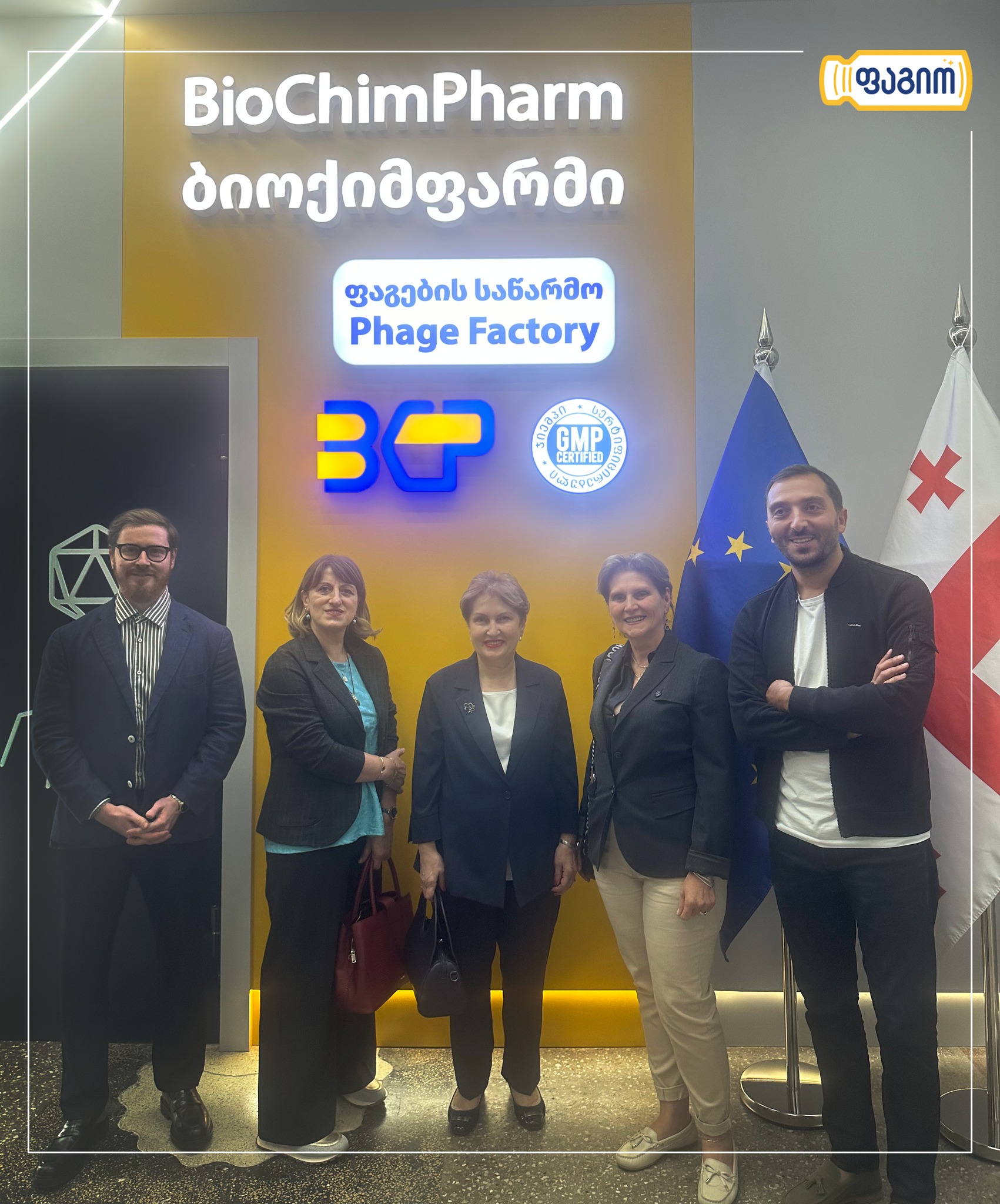
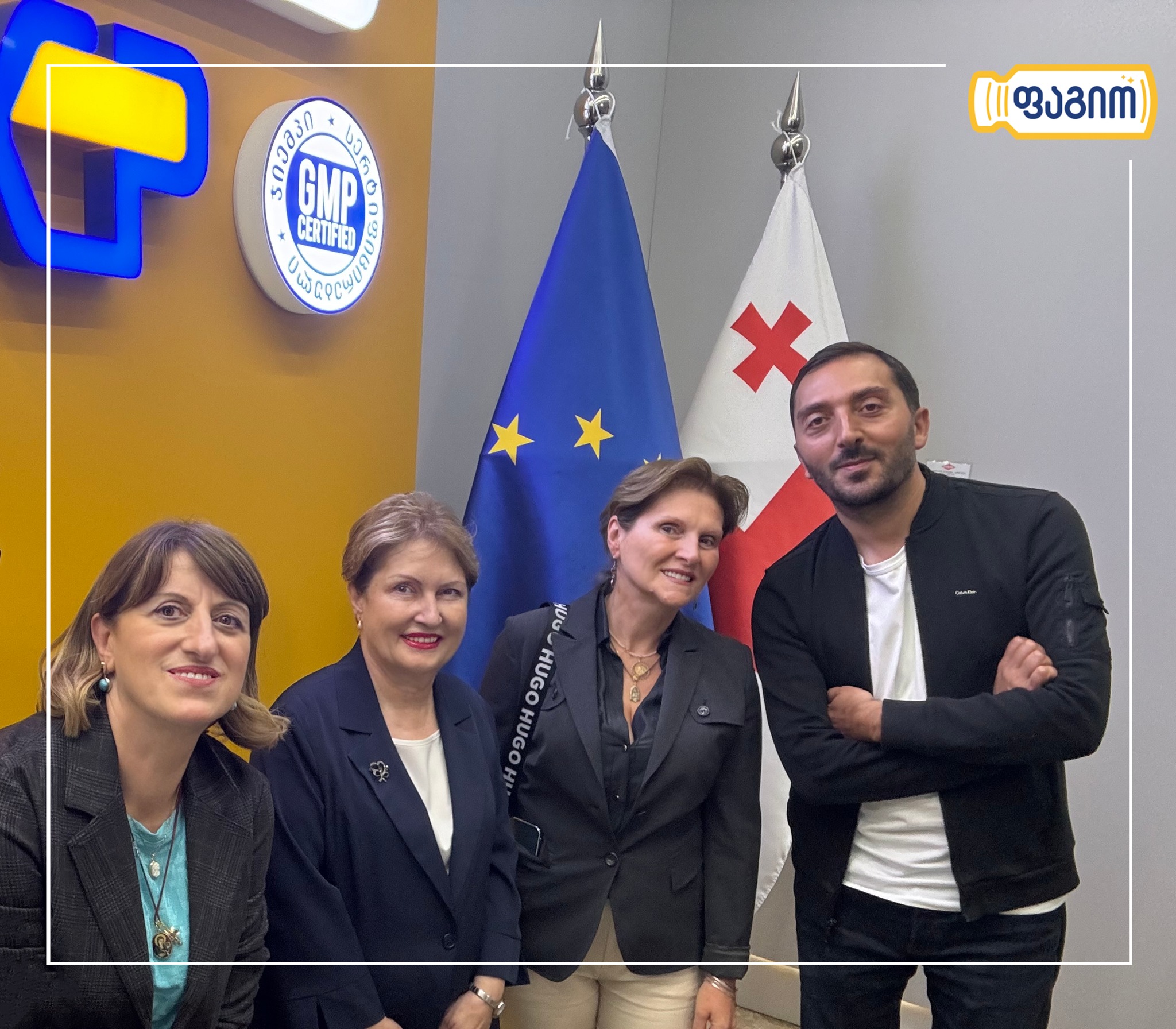
23 September, 2024
BioChimPharm congratulates “Procredit Bank” on its 25th anniversary.
18 September, 2024
Doctor of Medicine, Professor, Vice-President of the Association of Dentists of Georgia, Sopo Samkharadze talks about the future of phages in dentistry:
“Phages have a great perspective in dentistry. Phage products act against harmful bacteria and do not harm beneficial microflora.”
4 September, 2024
“Phagesti” is used in many diseases, be it infectious/traveler’s diarrhea, discomforts of the gastrointestinal tract, food poisoning, various bacterial or parasitic infections.
“Phagesti” is an effective and safe antibacterial preparation and it is used as soon as symptoms appear, both for treatment and prevention, including in children, from the first days of life (due to the absence of contraindications), and it is very good for both the child and the doctor. First of all, mothers and everyone knows that at a small (newborn/infants) age, we (pediatricians/mothers) are limited in giving drugs. In this regard, it is very convenient for the doctor to use “Phagyo” or “Phagesti” as needed.”
23 August, 2024
A video clip created by Enterprise Georgia within the framework of the #StrengtheningGeorgia program – the success story of “BioChimPharm”.
We thank the “Make in Georgia” agency and the Ministry of Economy and Sustainable Development for the support of the project.
29 July, 2024
The pediatrician recommends:
Tamta Ivanashvili – pediatrician, academic doctor of medicine, associate professor of the European University, head of the medical and scientific development service of the pediatric clinic Mmedi22, head of the children’s health and development center, president of the regional health protection association.
“BioChimPharm uses unique bacteriophage technology to create completely healthy, natural and effective preparations. Phagyo® and Fagesti®, as natural, safe products, will provide the best help to parents as soon as the first symptoms of the disease appear.
Phagyo® is a product widely introduced in practice, which most parents know well and successfully uses in such diseases as throat-ear-nose diseases, angina, sinusitis, bronchitis, inflammation of the middle ear, urogenital infections, cystitis, urethritis.
Phagesti® – destroys harmful bacteria causing gastrointestinal diseases and irritable bowel syndrome (dysbacteriosis); It increases the effectiveness of probiotics therapy; It does not harm the beneficial microflora, and most importantly, it is safe to use in children and pregnant women.”
14 June, 2024
The Georgian Phage producing company JSC “BioChimPharm” was awarded a certificate by the European Union’s research and innovation framework program “Horizon Europe”, recognizing it as one of the most active applicants and participants in the science and innovation program and a three-time holder of the SEAL of EXCELLENCE.
The main goal of participating in the program is to position Georgia as the cradle of phages in the fight against the global problem and challenge of antimicrobial resistance (AMR).


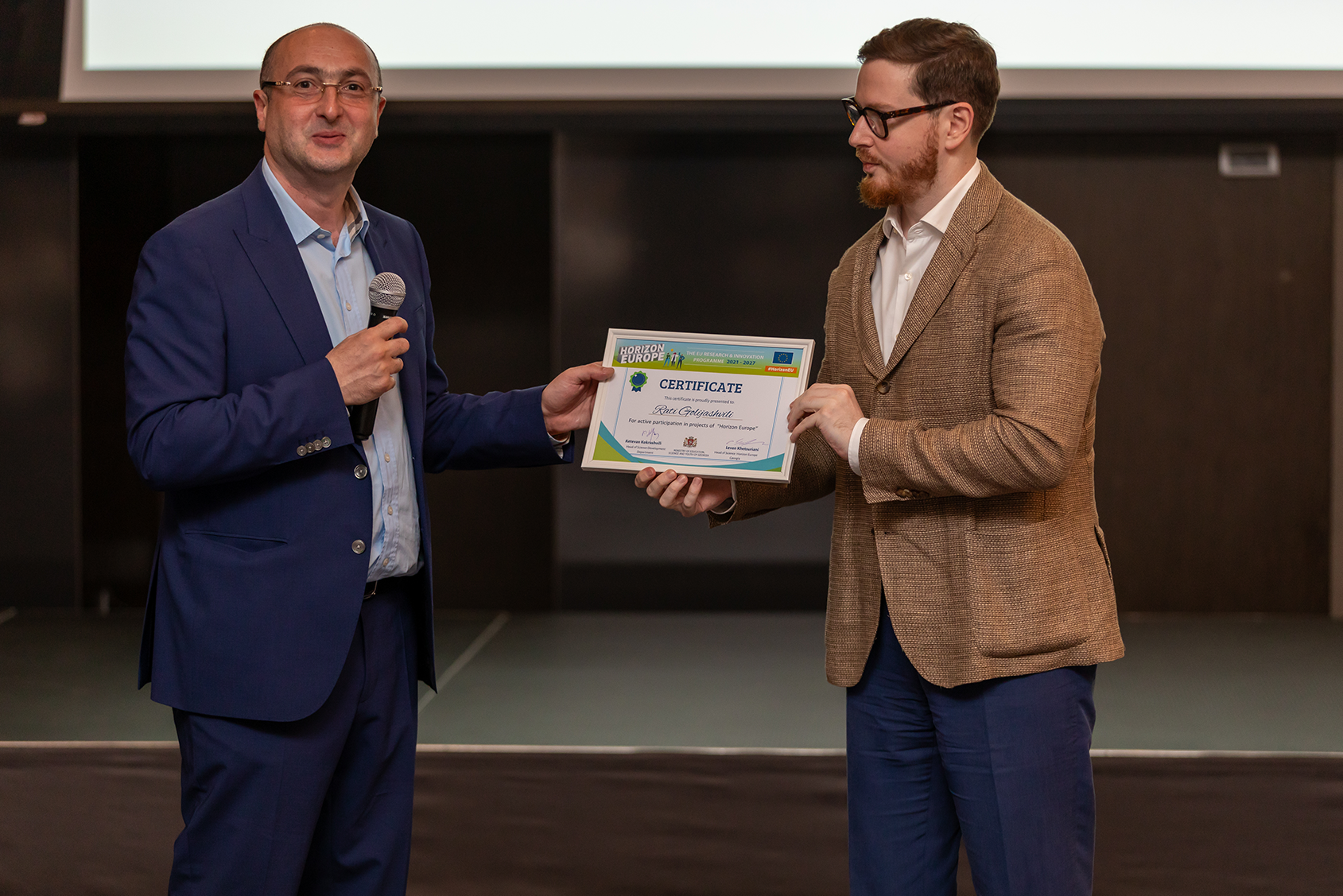
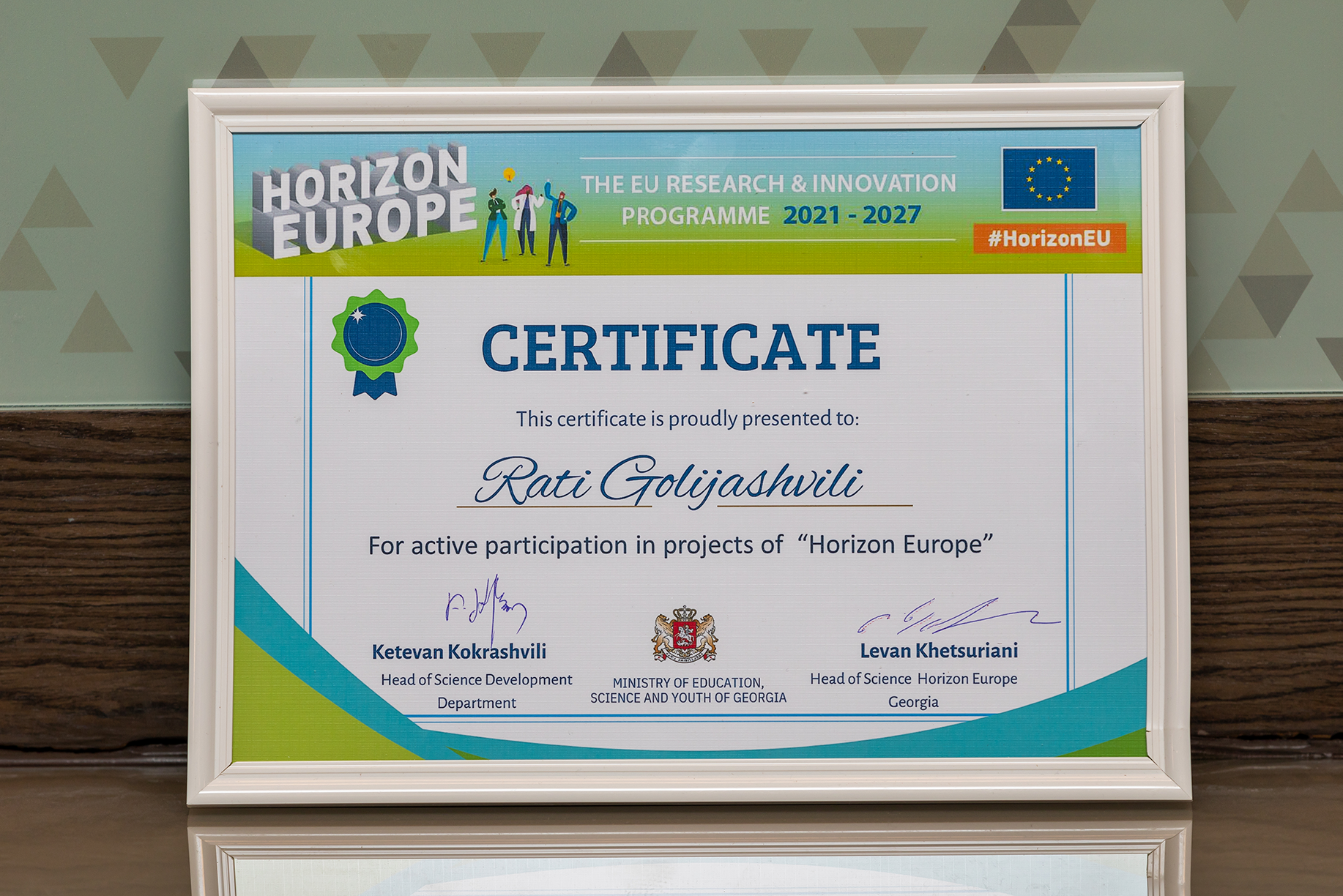
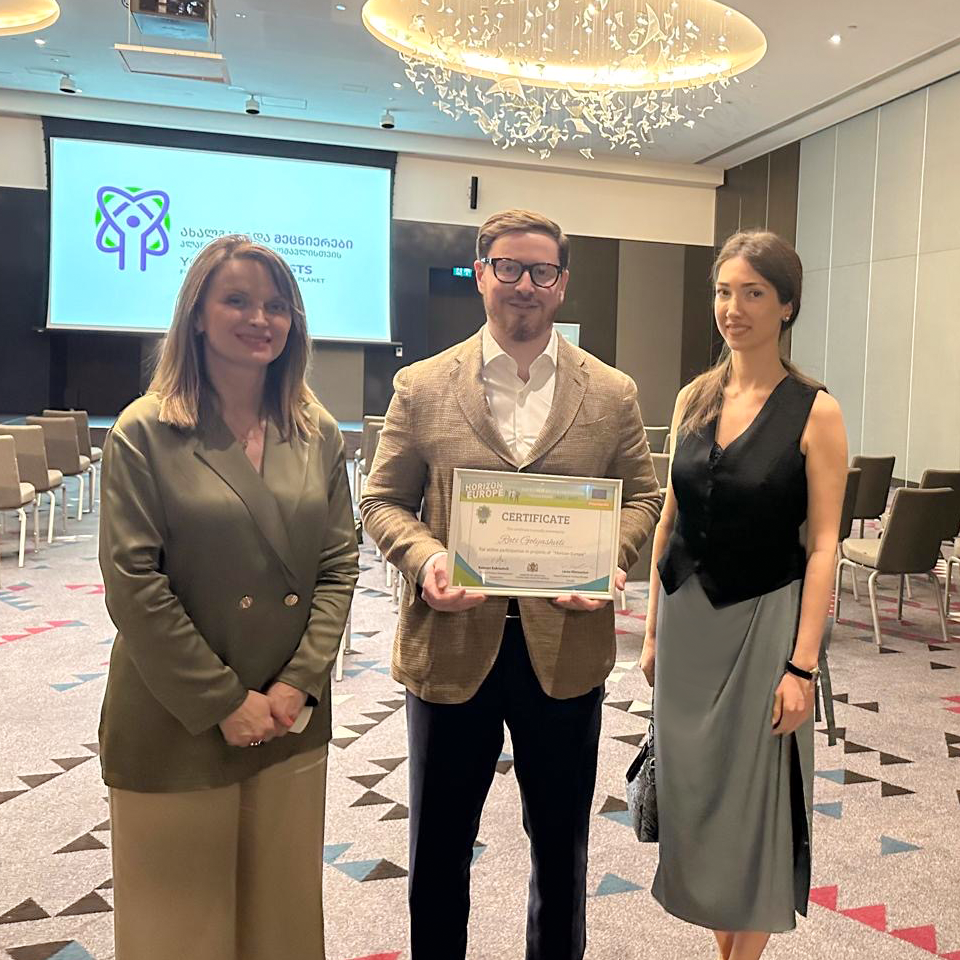
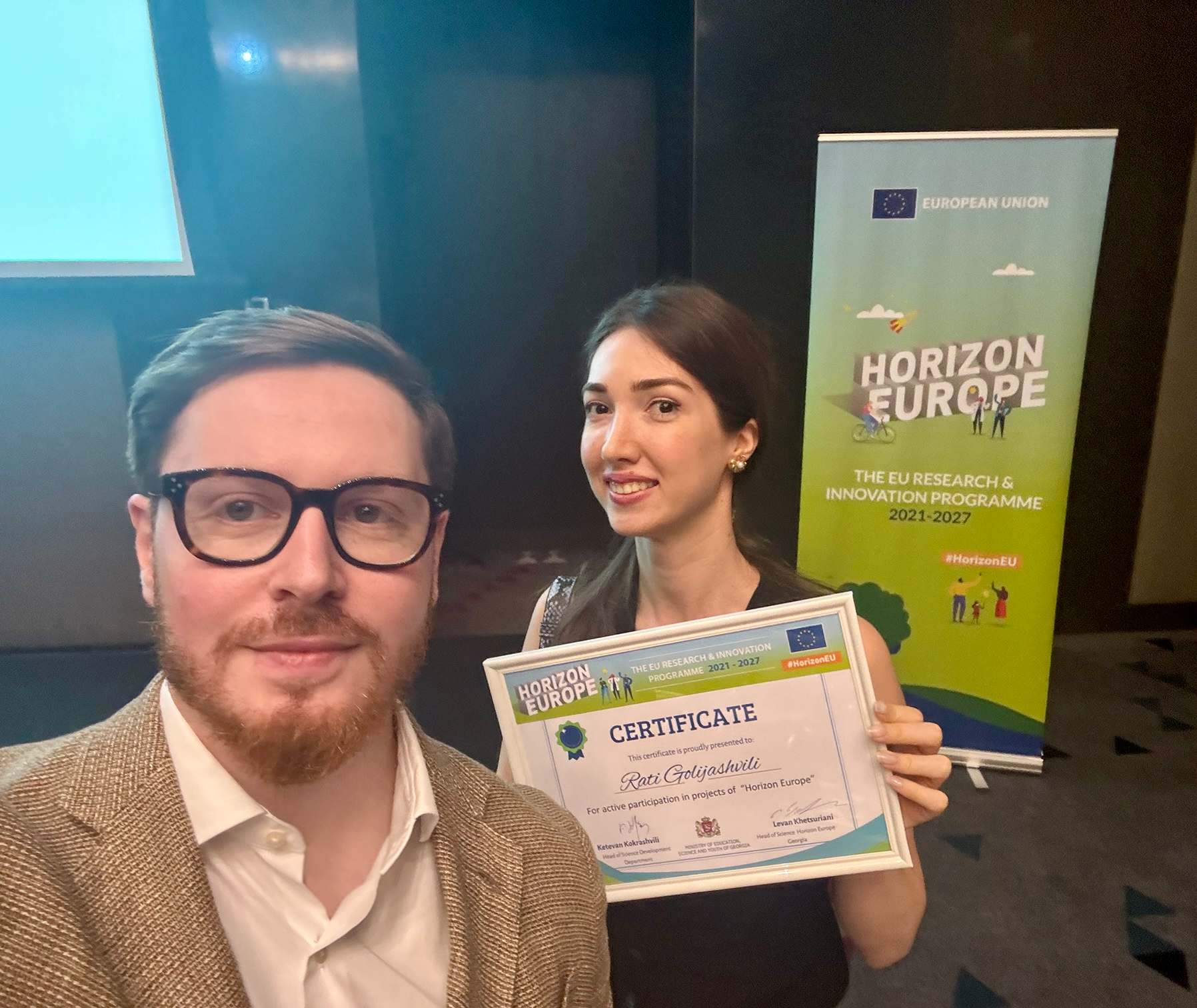
31 May, 2024
As a client and partner of the European Bank for Reconstruction and Development (EBRD) in the fight against antimicrobial resistance (AMR), BioChimPharm was included in the 2023 EBRD Sustainability Report. | With the support of the EBRD, as well as other local and international partners, ” BioChimPharm ” modernized the historical phage factory. With the compliance to standards recognized in the European Union, BioChimPharm received GMP certification.
As a result of the implementation of the 6.5 million euro project of renovation and modernization of the enterprise, the company took a leading position in the fight against the global antibiotic resistance crisis.
“Bacteriophages, also known as phages, are microorganisms, that specifically target bacteria. Phage therapy involves using phages to treat bacterial infections. In contrast to many antibiotics, phages target bacterial strains or species more narrowly, making phage therapy an attractive alternative for managing infections. Modernising BioChimPharm’s manufacturing plant in compliance with GMP will enable it to scale up production and potentially export phage products” – states the report.
29 May, 2024
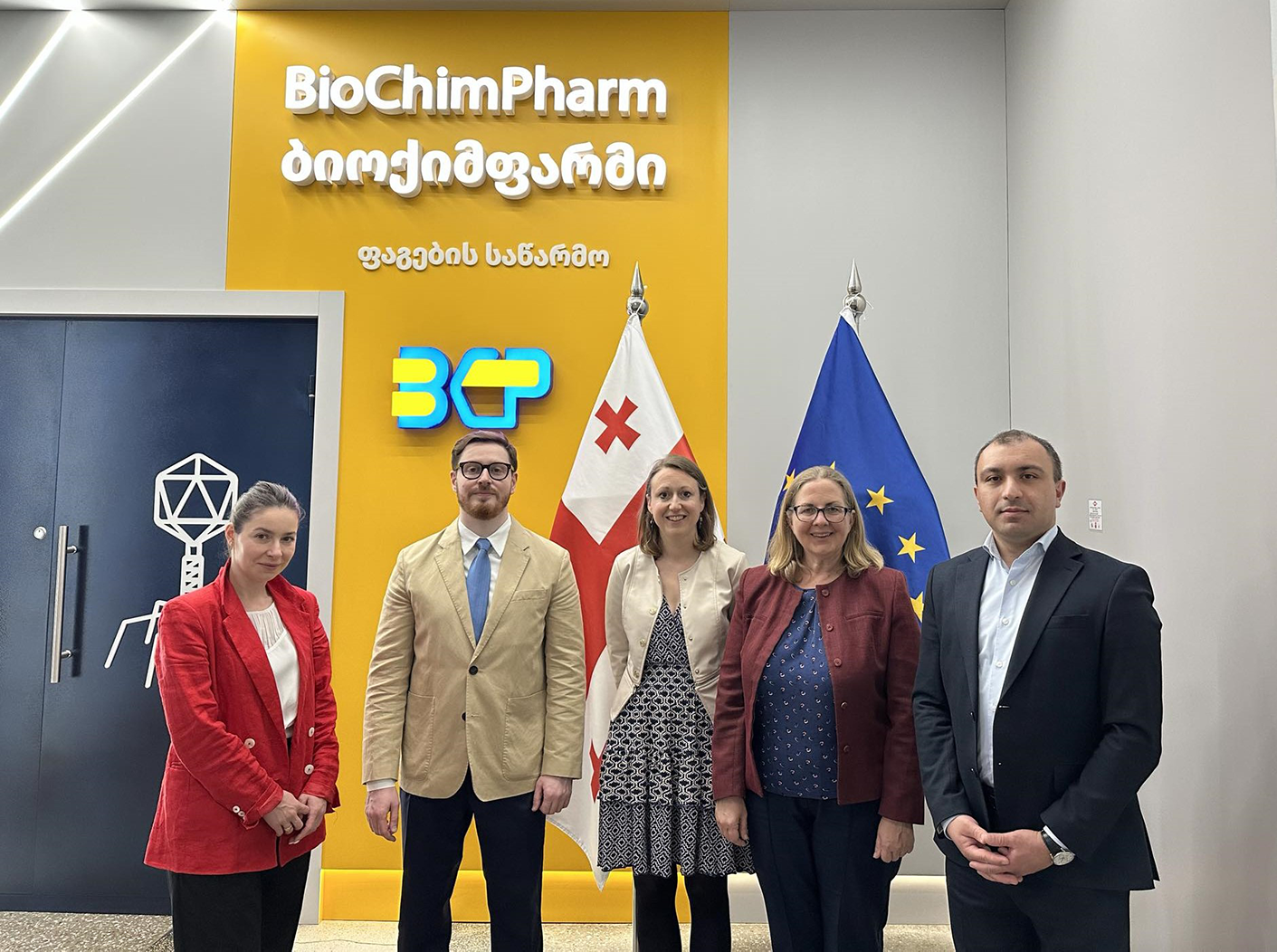
28 May, 2024
Mr.Alkis Drakinos, Regional Head of the Caucasus for the European Bank for Reconstruction and Development (EBRD) and EBRD team, conducted a visit to BioChimPharm’s historic phage factory.
Throughout the visit, EBRD team engaged in an in-depth exploration of the phage preparations production process and the operational procedures of the factory. Notably, the facility adheres to international good manufacturing practice (GMP) standards.
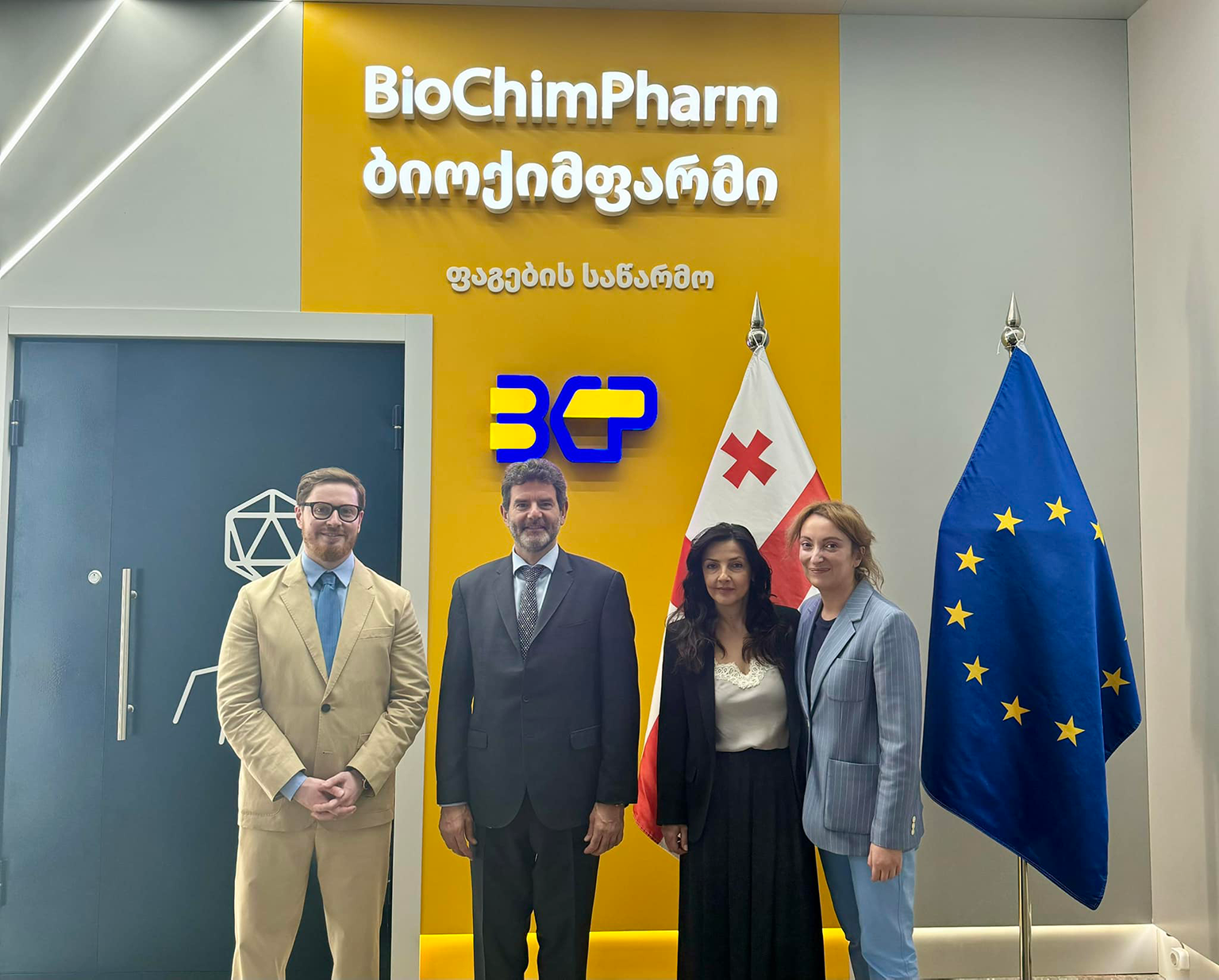
19 May, 2024
“BioChimpPharm” participated in the international workshop of the World Health Organization (WHO EURO) and the Global AMR R&D Hub: “Building the evidence base for broader use of bacteriophages for AMR from a One Health Perspective”
The speakers of “BioChimPharm” Rati Golijashvili (General Manager of JSC “BioChimPharm”) and Mariam Murtazashvili (Head of the quality control department of “BioChimPharm”) shared their experience to the workshop participants in the fight against AMR and production of GMP-compliant pharmaceuticals. The event was hosted by the National Center for Disease Control and Public Health (NCDC).
After the workshop, “BioChimPharm” hosted the World Health Organization (WHO EURO) team and phage specialists on a tour of the phage factory.
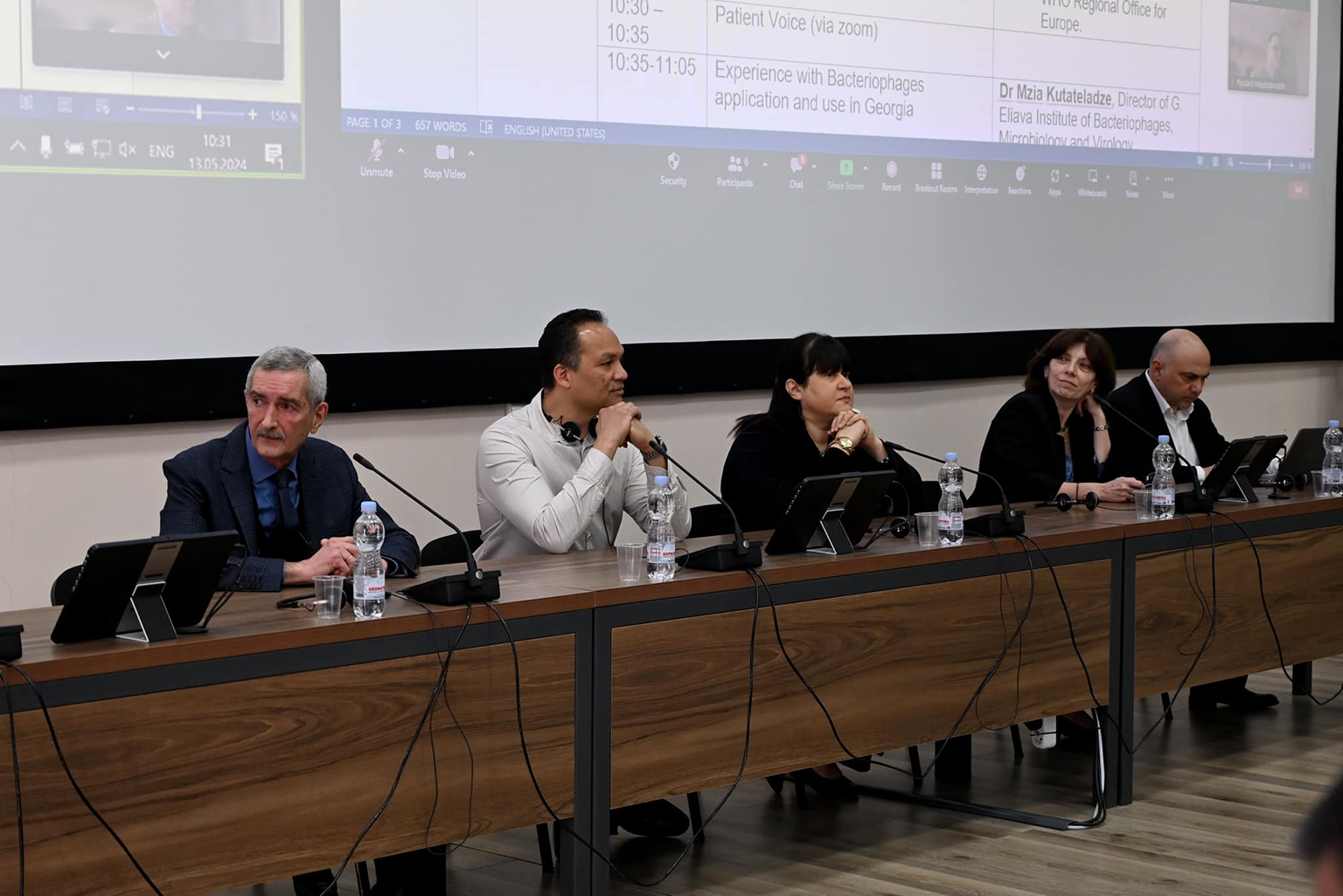



24 April, 2024
JSC “BioChimPharm” participated in the symposium organized by the European Bank for Reconstruction and Development (EBRD), which was focused on combating antibiotic resistance (AMR). According to the World Health Organization (WHO), AMR is one of the world’s most critical problems.
Rati Golijashvili, the general manager of JSC “BioChimPharm,” presented at the symposium the unique phage technology and the successful modernization project of BioChimPharm’s historical phage factory.
The symposium was held on April 18 at the EBRD headquarters in London, Great Britain.
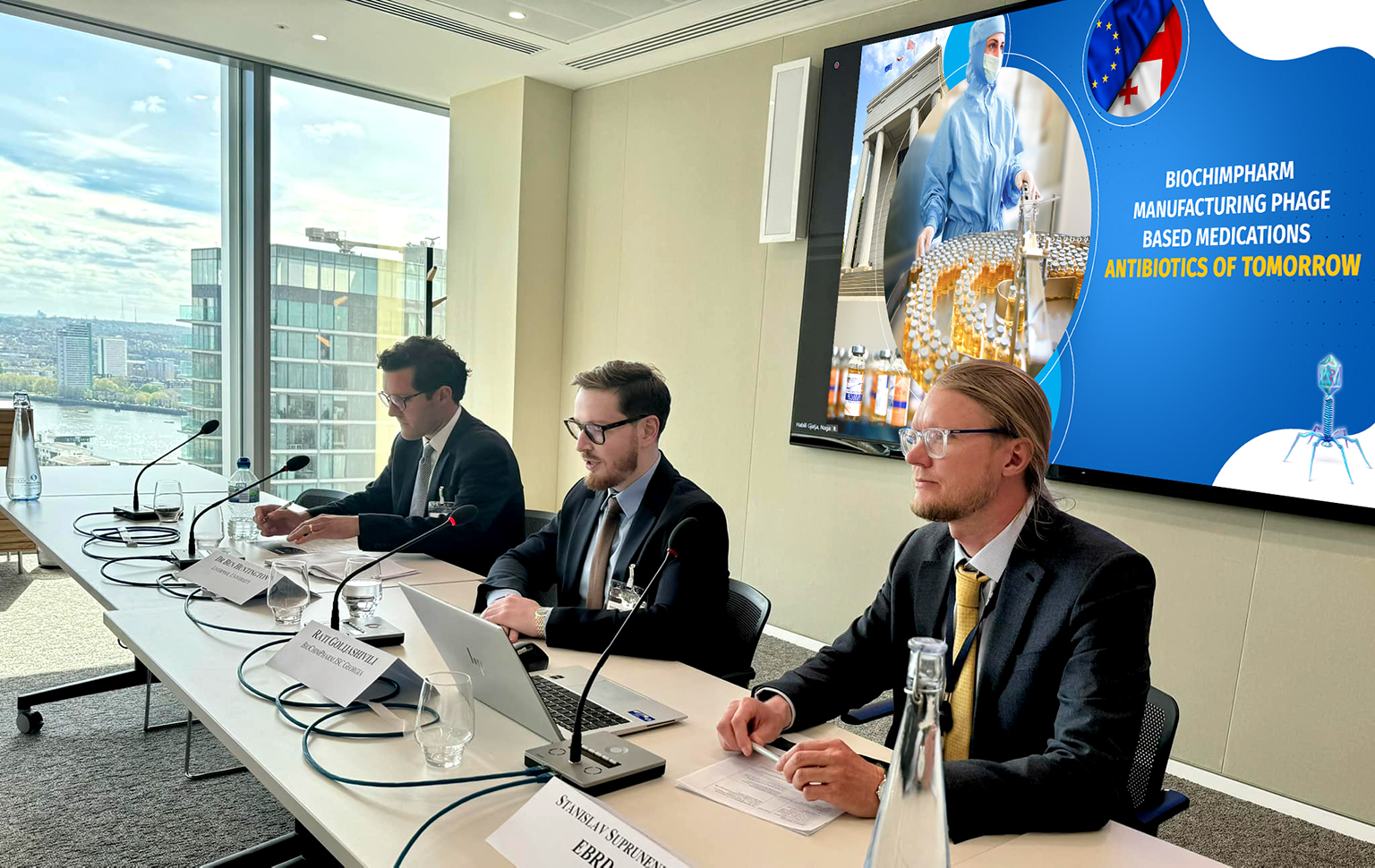

27 March, 2024
On March 19, by the decision of the Georgian Government, in order to maximize the global competitiveness and scientific potential of the Georgian economy, 3 main technological directions of the country were defined, and among them, phage technology became one of the key directions.
“Georgia is a pioneer in this technology, and the country has almost a century of experience in phage research and development. Today, when the demand for phages is dramatically increasing worldwide, Georgia can offer the world advanced phage products,”- stated the Prime Minister of Georgia.
“Georgia has a very large and important potential, as well as a historical context in the research and development of phage products. Today’s announcement by the Prime Minister and the Vice Prime Minister is a uniquely positive signal for the entire field, and I hope that it will be a turning point in the field of biotechnology and phage development in Georgia. We often say that Georgia is the cradle and homeland not only wine, but also phages, and in Georgia, we have accumulated technological experience of about 100 years. Today, phages, or bacteriophages, are the only available alternative to antibiotics, and we can position ourselves as a hub in the fight against antibiotic resistance.
These are two important ways to fully utilize the opportunities and potential that we have in Georgia in the direction of the fight against antibiotic resistance with phage technology,” said Rati Golijashvili, General Manager of BioChimPharm.
The newly modernized plant of the Georgian biopharmaceutical Company “BioChimPharm” is located in the historic Bacteriophage Institute (1934) in Tbilisi and is the first GMP (Good Manufacturing Practice) certified plant in the South Caucasus, which produces sterile forms of medicine and covers the full production cycle.
The 2-year, € 6.5 million project of modernization and EU manufacturing standard compliance of the enterprise was implemented with the support of the European Union, EBRD, local agencies under the Ministry of Economy and Sustainable Development of Georgia – “Enterprise Georgia” and “GITA” (Innovation and Technology Agency).
The company “BioChimPharm” is based on the historical phage manufacturing factory that has been producing life-saving phage preparations since 1930s.
The company aims to internationalize its operations, expand its export area beyond region and enable access to life-saving phage preparations for patients suffering from antibiotic resistant infections across the globe. In the next 2-3 years, the Company plans to be represented on the European market with several products, and in the medium term – to make unique Georgian phage preparations available in more than 100 countries.
5 August, 2023
The World Economic Forum has highlighted phage technology as one of the Top 10 Emerging Technologies in 2023!
“At BioChimPharm, we are very proud of to be the significant contributor in the fight against AMR and a part of the Phage technology renaissance taking place across the globe” Rati Golijashvili, Managing Director.
World Economic Forum reveals the Top 10 Emerging Technologies of 2023 report:
1.Designer phages.
2.Flexible batteries.
3.Generative artificial intelligence.
4.Sustainable aviation fuel.
5.Metaverse for mental health.
6.Wearable plant sensors.
7.Spatial omics.
8.Flexible neural electronics.
9.Sustainable computing.
10.AI-facilitated healthcare.
“For more than a decade, the Forum has been surveying academics, industry leaders and futurists on the emerging technologies set to transform economies and societies. In doing so, the Top 10 Emerging Technologies of 2023 report seeks to help professionals across sectors and industries anticipate exponential technologies, interpret their implications and champion industry-shaping and society-serving applications” — Jeremy Jurgens, the Managing Director of World Economic Forum.
With antibiotic resistance becoming a critical global concern, this recognition highlights the importance of incorporating phage therapy into our arsenal of medical advancements.
This recognition by the World Economic Forum is a testament to the immense potential of phages in transforming healthcare and addressing the challenges posed by antibiotic resistance. The implications for patient care, public health, and the pharmaceutical industry are tremendous.
Phages are showing potential for treating microbiome associated diseases and revolutionizing the engineering of microbiomes for human, animal and plant health.
Phages are also being designed as feed supplements to enhance the growth of livestock, treat certain plant diseases and eliminate dangerous bacteria in food supply chains, in alignment with the World Health Organization’s “One Health” approach.
More about this groundbreaking technology and its role in shaping the future of medicine, read the World Economic Forum’s report here: https://ow.ly/SK2v50PsAh8
BioChimPharm (BCP) is a Georgian-based, multi-award-winning biopharmaceutical Company engaged in R&D, production and marketing of novel antibiotics against antimicrobial resistance (AMR) based on bacteriophages or simply phages. BCP’s mission is to eradicate the irrational use of antibiotics and to overcome antibiotic resistance challenge globally. Based on the World’s Oldest Phage Factory (1934), The Company possesses unique technological know-how and nearly 100 years of accumulated experience in R&D and the production of Phage based medications, used for treatment and prevention of infectious diseases including antibiotic resistant infections.
The Company utilizes paradigm shifting, phage technology platform that effectively and sustainably replaces antibiotics in both the human and animal health industries. The Phage based novel antibiotics provided by the Company, have helped millions of patients suffering from antibiotic-resistant infections globally. BCP is an ISO 9001-2015 and EU GMP (Good Manufacturing Practice) certified company.
2 August, 2023
Some of you may already be aware of the completion of our EUR 6 million modernization project at the historic phage manufacturing facility in Tbilisi, which dates back to 1934. We are now producing life-saving, phage-based novel antibiotics with European precision and quality.
„We would like to express our heartfelt appreciation to our dear local and international partners (European Union, EBRD, Enterprise Georgia, FAO, ProCredit Bank and GITA). Without them, this project would not have been possible. To honor their contributions, we proudly introduce the PHAGE AWARD, recognizing their outstanding commitment to fighting antimicrobial resistance and advancing phage technology.“ – Rati Golijashvili, General Manager of BioChimPharm.
In today’s focus, we highlight Delegation of the European Union in Georgia! We extend our sincere gratitude to the Delegation of the European Union to Georgia, European Union Ambassador to Georgia, Mr. Paweł Herczyński and Team Leader Economic Development and Trade, Mr. Dominik Papenheim, for their remarkable support in the fight against antimicrobial resistance and the development of Phage Technology.
Please join us in celebrating this achievement by viewing the photos from our prize-giving ceremony.
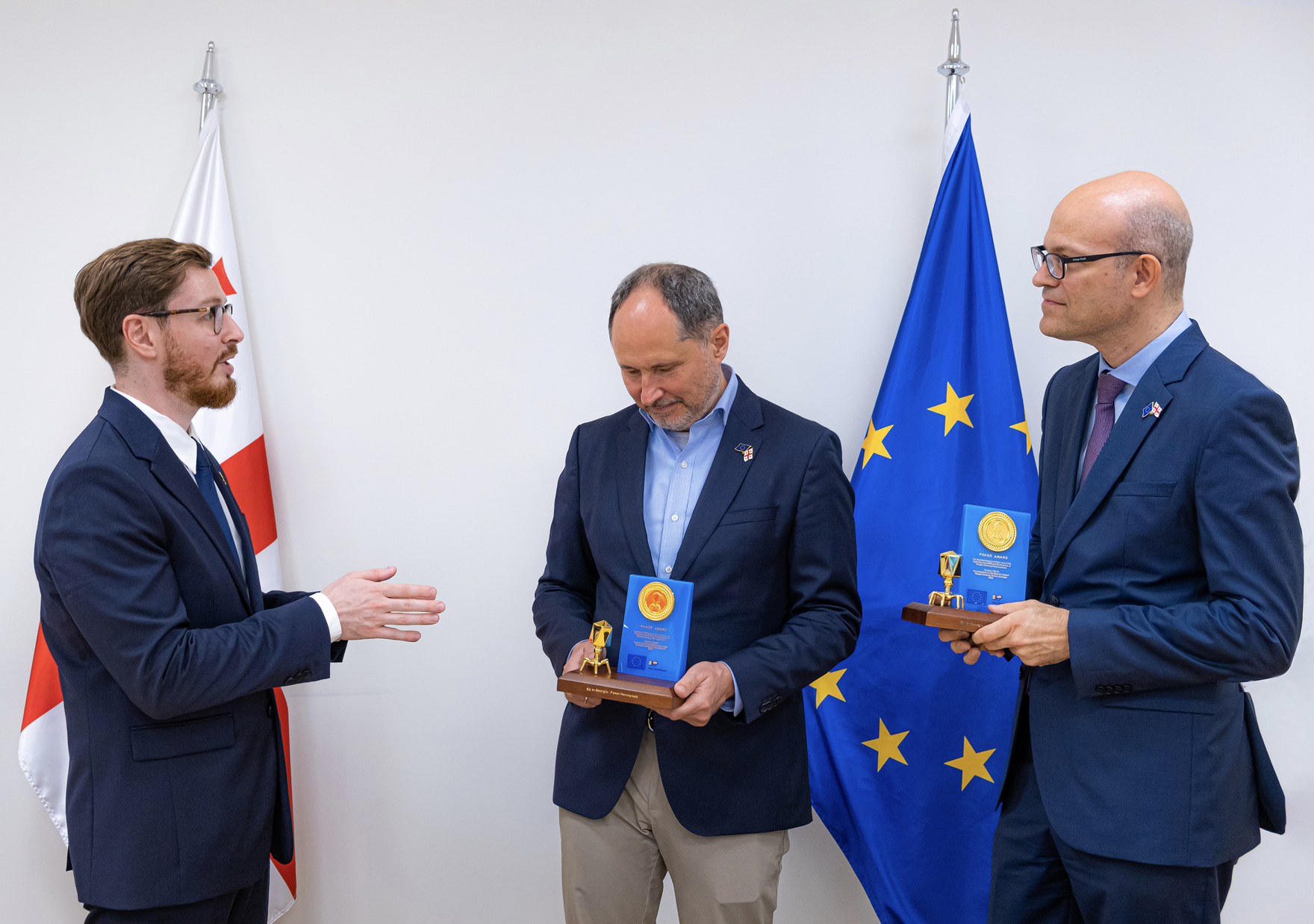
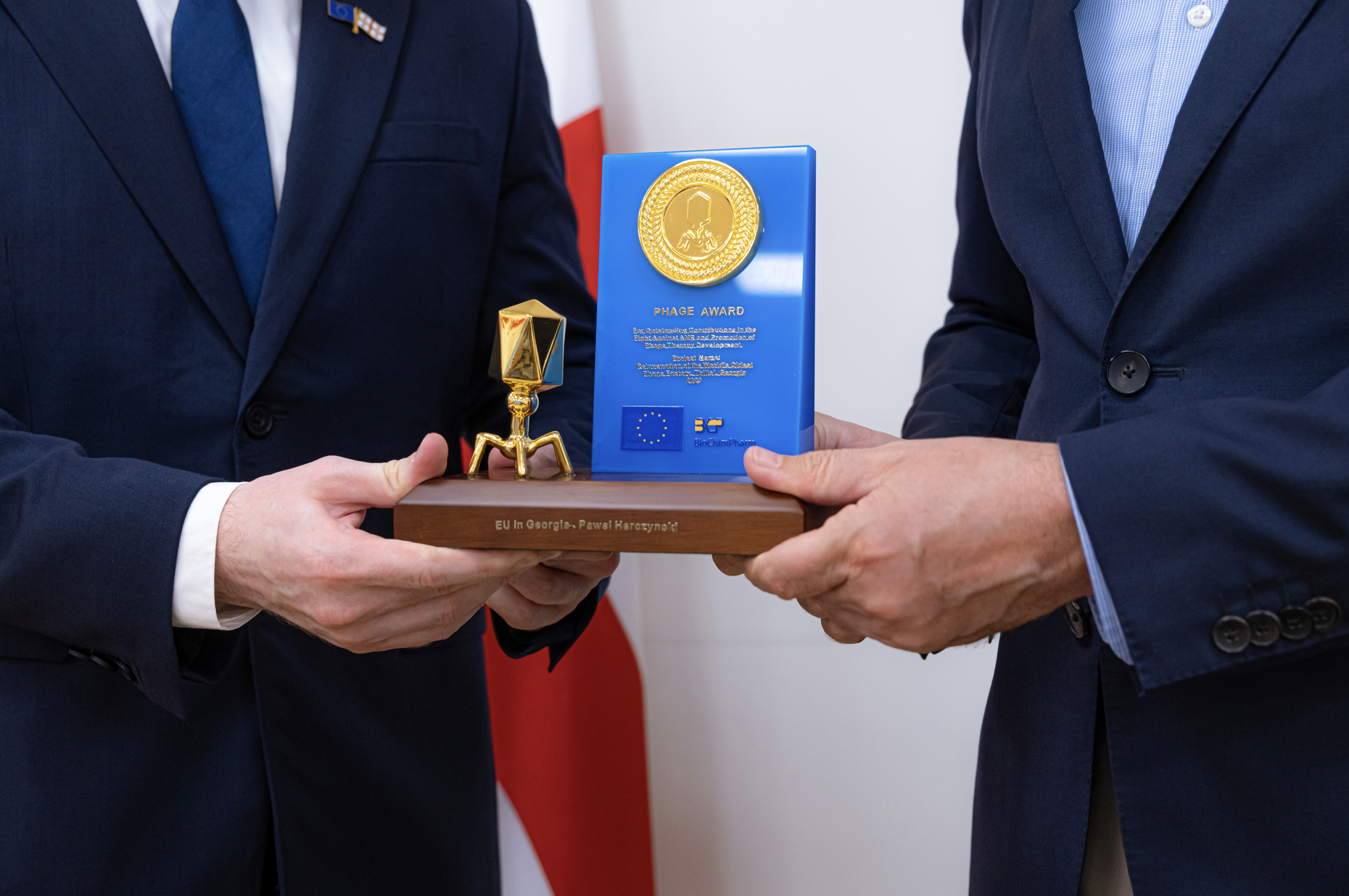
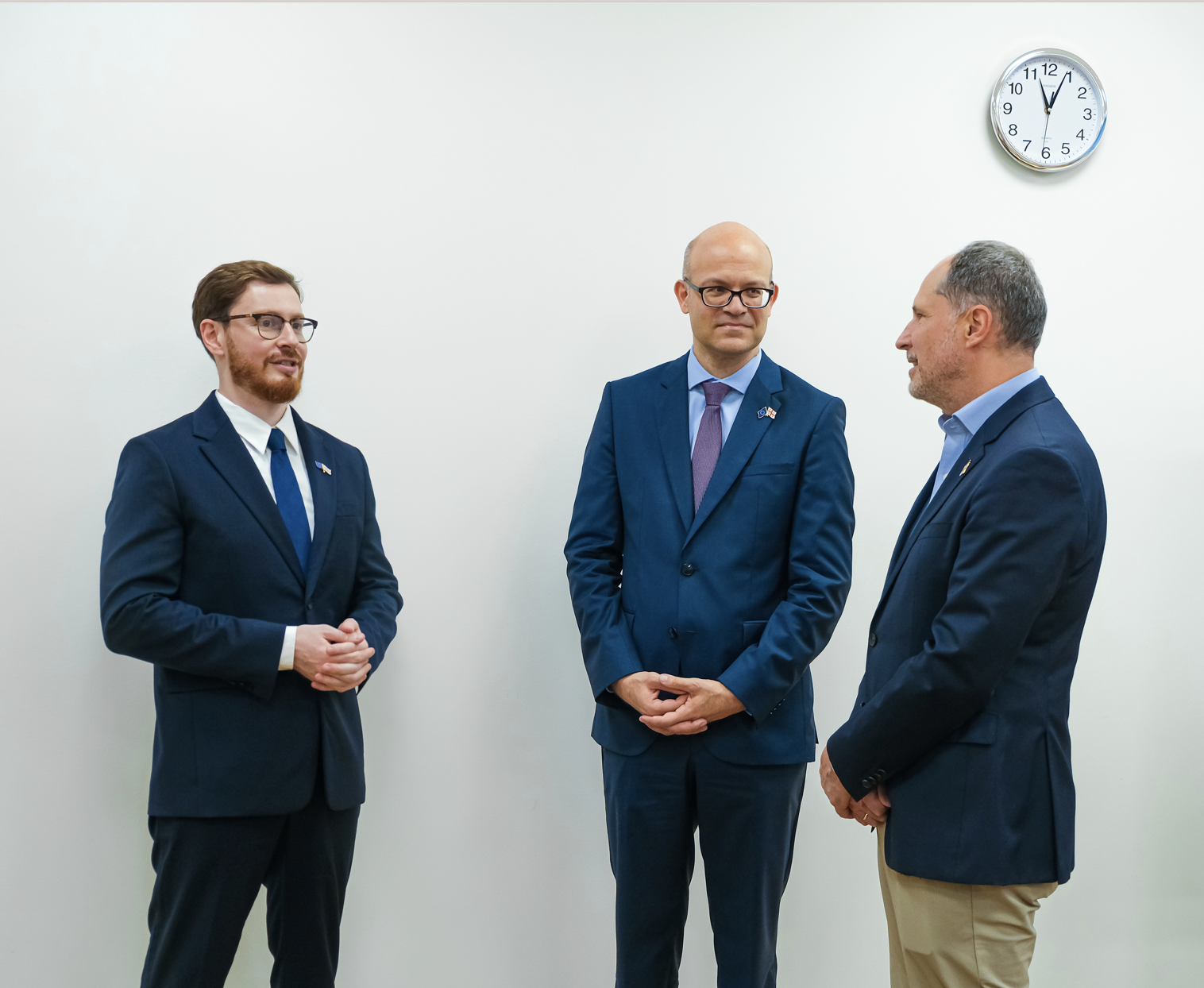
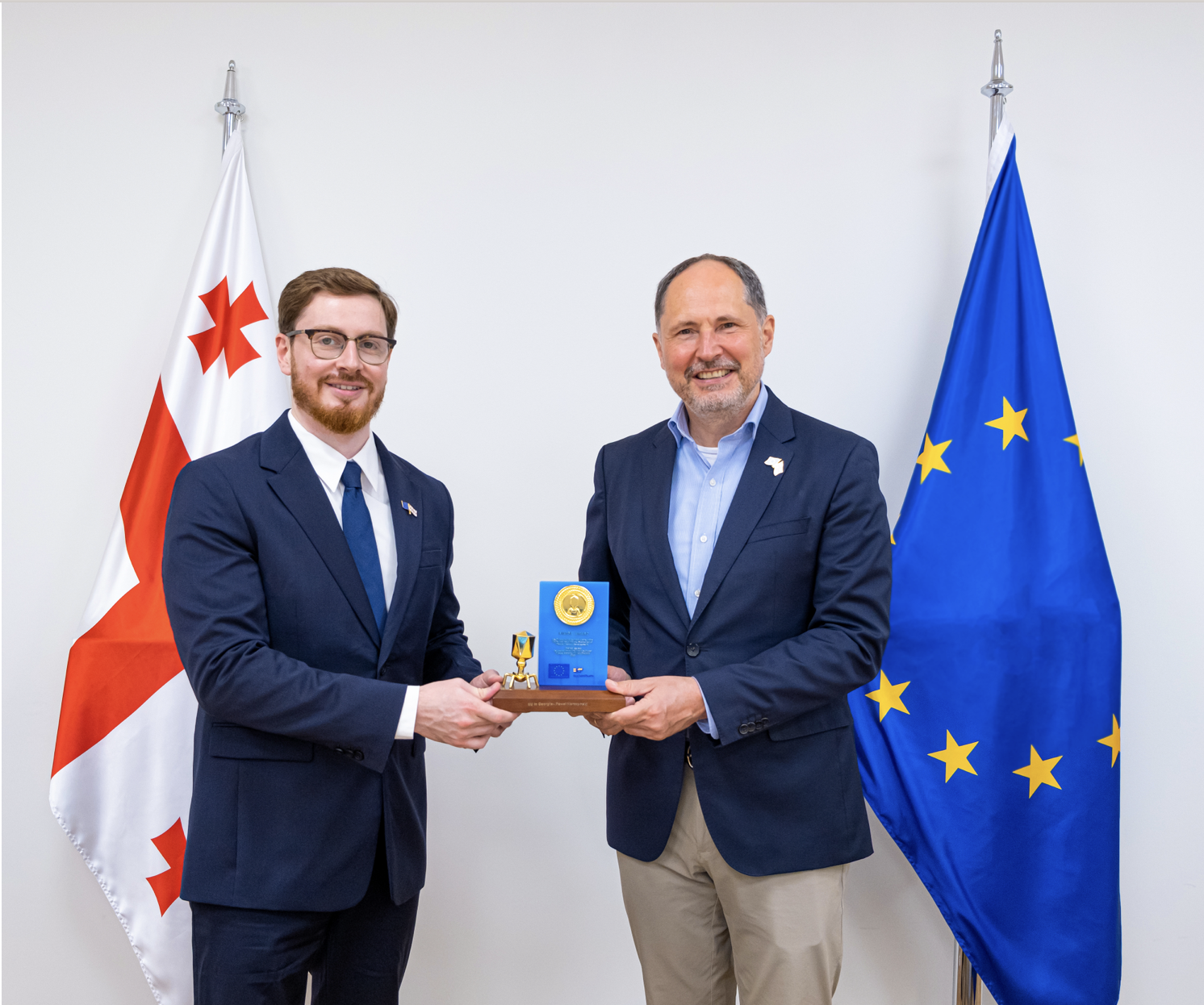
26 July, 2023
Some of you may already be aware of the completion of our EUR 6 million modernization project at the historic phage manufacturing facility in Tbilisi, which dates back to 1934. We are now producing life-saving, phage-based novel antibiotics with European precision and quality.
„We would like to express our heartfelt appreciation to our dear local and international partners (Ministry of Economy and Sustainable Development – Within the co-financing programs of “Enterprise Georgia” and the Georgia’s Innovation & Technology Agency, European Union, EBRD, FAO and ProCredit Bank) without whom this project would not have been possible. To honor their contributions, we proudly introduce the PHAGE AWARD, recognizing their outstanding commitment to fighting antimicrobial resistance and advancing phage technology.“ – Rati Golijashvili, General Manager of BioChimPharm.
In today’s focus, we highlight the Ministry of Economy and Sustainable Development (Georgia)! We extend our sincere gratitude to the Ministry of Economy and Sustainable Development, the Minister of Economy and Sustainable Development, Levan Davitashvili, and Deputy Minister of Economy and Sustainable Development of Georgia, Irakli Nadareishvili, for their remarkable support in the fight against AMR and the development of Phage Technology Within the co-financing programs of “Enterprise Georgia” and the Georgia’s Innovation & Technology Agency.
Please join us in celebrating this achievement by viewing the photos from our prize-giving ceremony, which showcase the dedication of our partners. Together, we are making significant strides in combating AMR and propelling Phage Technology.
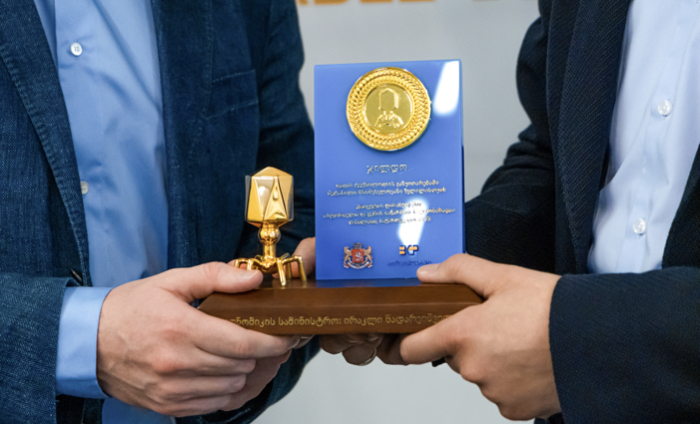
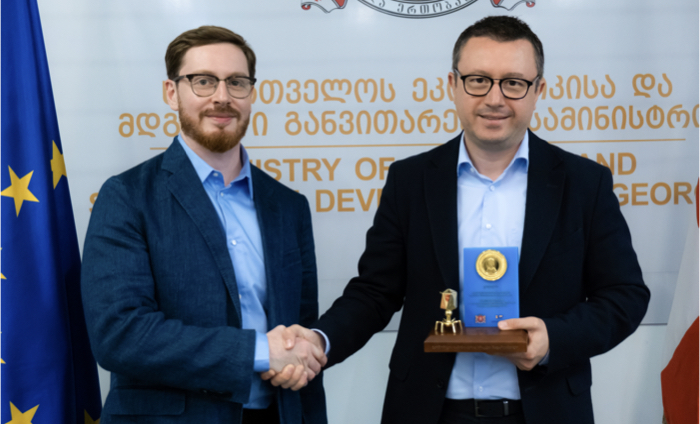


21 July, 2023
Phage Awards – GITA
Некоторые из вас, возможно, уже знают о завершении нашего проекта модернизации на сумму 6 миллионов евро на историческом заводе по производству фагов в Тбилиси, основанном в 1934 году. Мы сейчас производим спасительные жизни новые антибиотики на основе фагов с европейской точностью и качеством.
“Мы хотели бы выразить нашу искреннюю благодарность нашим уважаемым местным и международным партнерам (Европейскому Союзу, ЕБРР, Enterprise Georgia, ФАО, ПроКредит Банку и GITA), без которых этот проект не был бы возможен. В честь их вклада, мы с гордостью представляем ПРИЗ ФАГА, признающий их выдающееся усердие в борьбе с антимикробной резистентностью и развитии фаговой технологии.” – Рати Голиджашвили, Генеральный Директор ЗАО “BioChimPharm”.
В сегодняшнем фокусе мы выделяем GITA! Мы выражаем искреннюю благодарность Агентству Инноваций и Технологий Грузии, команде GITA и Председателю GITA – Агентству Инноваций и Технологий Грузии, Автандилу Касрадзе, за их замечательную поддержку в борьбе против АМР и развитии Фаговой Технологии. Меморандум о взаимопонимании, касающийся создания новых инновационных биофармацевтических и биотехнологических продуктов, направленных на преодоление глобального вызова антимикробной резистентности, был подписан между “BioChimPharm” и GITA.
Присоединяйтесь к нам в праздновании этого достижения, просматривая фотографии с нашей церемонии награждения, которые демонстрируют самоотверженность наших партнеров.
Вместе мы делаем значительные шаги в борьбе с АМР и продвижении Фаговой Технологии.
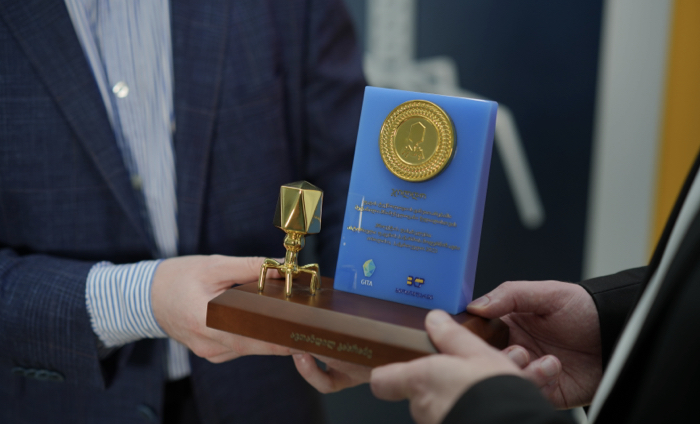
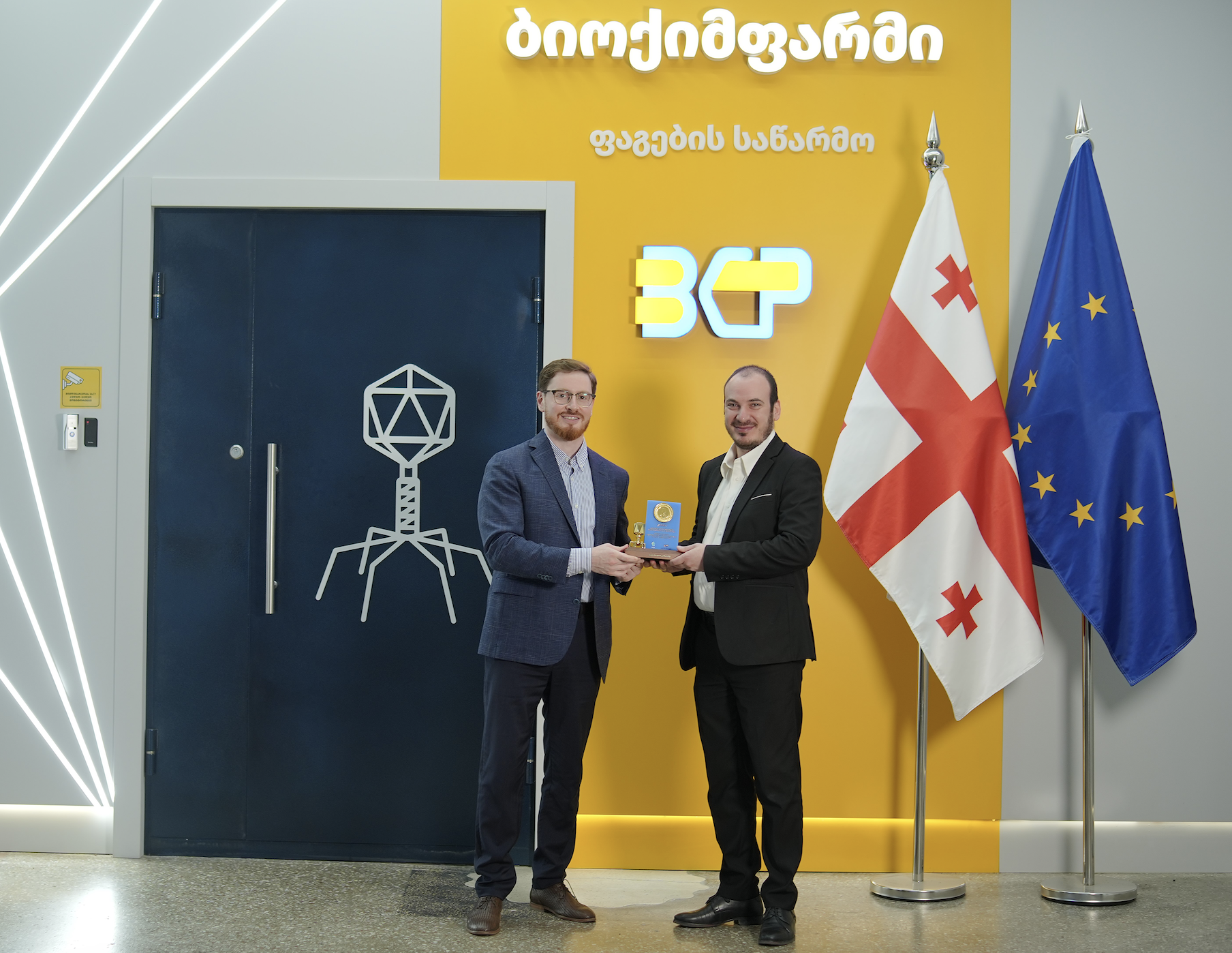

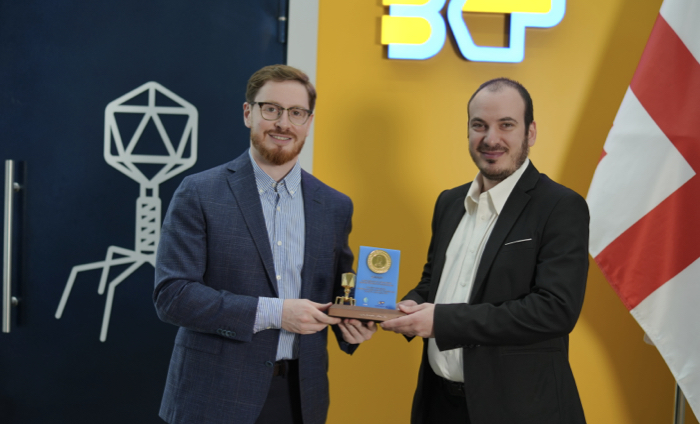
12 July, 2023
Georgia, renowned for its 8,000-year-old winemaking tradition, also holds a significant place in the development of phage technology and therapy. The country boasts a rich history in this field, with early research and discoveries dating back to the early 20th century. Today, Georgia continues to be a pioneer in phage therapy, with institutions like Phage Factory BioChimPharm leading the way. BioChimPharm complated EUR 6 million modernization project at the historic phage manufacturing facility in Tbilisi, which dates back to 1934.
Located in the heart of Tbilisi, the newly modernized BioChimPharm manufacturing plant operates within the historic Bacteriophage Institute. This facility is the first in the South Caucasus to produce sterile liquid dosage forms, covering the entire production cycle, from the production of active pharmaceutical ingredients (APIs) to primary and secondary packaging of medicines. This state-of-the-art facility adheres to Good Manufacturing Practice (GMP) standards to ensure the highest quality and safety of phage-based products.
As phage therapy gains recognition globally, collaboration and knowledge-sharing between institutions like Phage Factory BioChimPharm are essential for advancing the field. The pioneering work conducted in Georgia has the potential to significantly impact the global fight against antibiotic resistance. By further expanding clinical trials and collaborations, Phage Factory BioChimPharm aims to provide effective phage-based treatments for a wide range of bacterial infections.
Phage pharmaceuticals
Bacterial infections of the upper and lower respiratory tract (inflammation of the sinuses, otitis media, tonsillitis, pharyngitis, laryngitis, tracheitis, bronchitis, pneumonia, pleuritis)

Phagyo® has liquid form that can be taken orally and/or through local procedures, in consultation with a doctor. The dosage for adults is 20ml two-three times a day. For more detailed information, please refer to this annotation.
Phage Therapy Georgia
In conclusion, Georgia’s rich history in phage technology, combined with the groundbreaking advancements made by Phage Factory BioChimPharm, positions the country at the forefront of phage therapy. With its state-of-the-art manufacturing facility and successful clinical applications, Georgia continues to contribute to the global fight against antimicrobial resistance, offering new hope in the form of phage-based treatments.
7 July, 2023
Some of you may already be aware of the completion of our EUR 6 million modernization project at the historic phage manufacturing facility in Tbilisi, which dates back to 1934. We are now producing life-saving, phage-based novel antibiotics with European precision and quality.
„we would like to express our heartfelt appreciation to our dear local and international partners (European Union, EBRD , Enterprise Georgia, FAO, ProCredit Bank and GITA) without whom this project would not have been possible. To honor their contributions, we proudly introduce the PHAGE AWARD, recognizing their outstanding commitment to fighting antimicrobial resistance and advancing phage technology.“ – Rati Golijashvili, General Manager of JSC Biochimpharm.
In today’s focus, we highlight the European Union and the FAO Georgia! We extend our sincere gratitude to the Food and Agriculture Organization (FAO), the FAO Georgia team, and the FAO Programme Coordinator, Javier Sanz Alvarez, for their remarkable support, under ENPARD III of the European Union, in the fight against AMR and the development of phage Technology.
Please join us in celebrating this achievement by viewing the photos from our prize-giving ceremony, which showcase the dedication of our partners. Together, we are making significant strides in combating AMR and propelling Phage Technology.
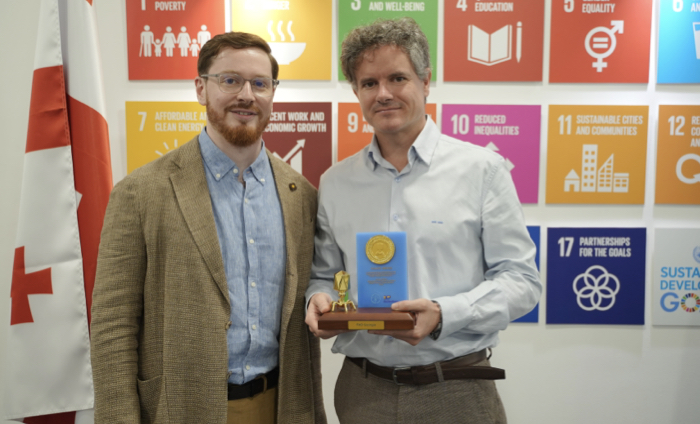
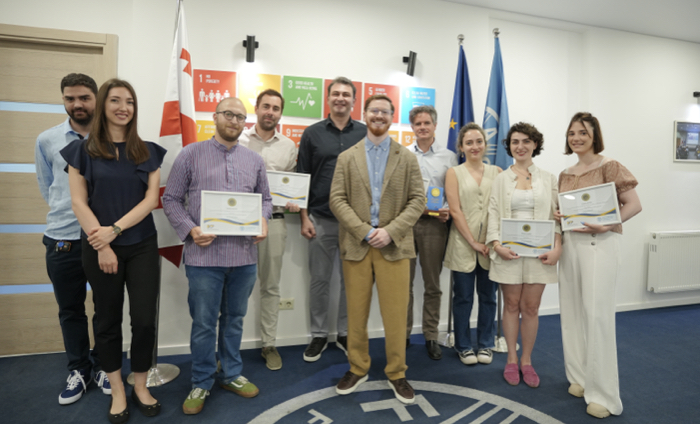
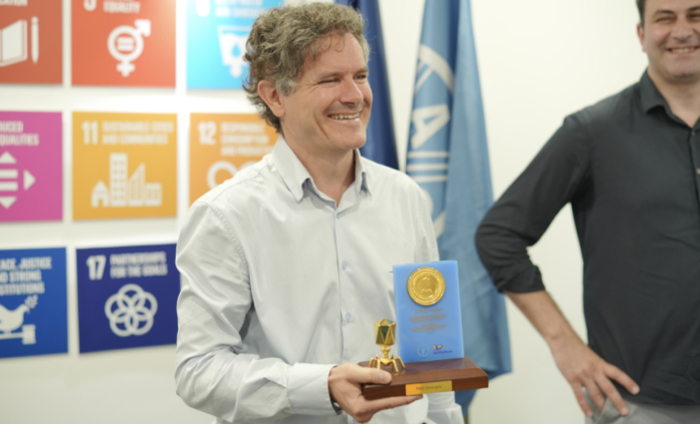
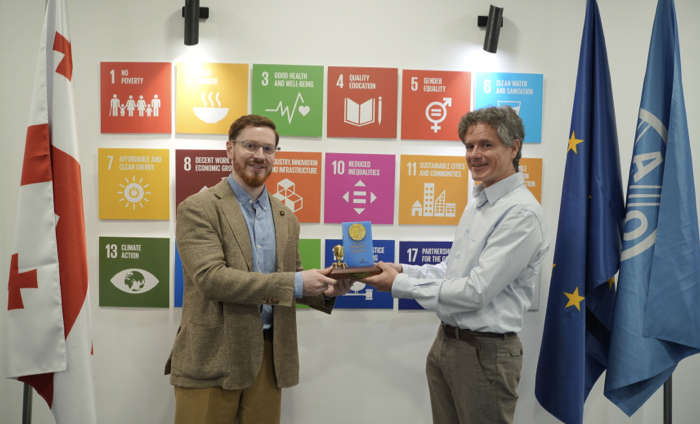
6 July, 2023
Some of you may already be aware of the completion of our EUR 6 million modernization project at the historic phage manufacturing facility in Tbilisi, which dates back to 1934. We are now producing life-saving, phage-based novel antibiotics with European precision and quality.
„We would like to express our heartfelt appreciation to our dear local and international partners (European Union, EBRD, Enterprise Georgia, FAO, ProCredit Bank and GITA) without whom this project would not have been possible. To honor their contributions, we proudly introduce the PHAGE AWARD, recognizing their outstanding commitment to fighting antimicrobial resistance and advancing phage technology.“ – Rati Golijashvili, General Manager of JSC Biochimpharm.
In today’s focus, we highlight the EBRD! We extend our sincere gratitude to the European Bank for Reconstruction and Development, the EBRD Georgia team, and EBRD Regional Director, Catarina Bjorlin Hansen, for their remarkable support in the fight against AMR and the development of Phage Technology.
Please join us in celebrating this achievement by viewing the photos from our prize-giving ceremony, which showcase the dedication of our partners. Together, we are making significant strides in combating AMR and propelling Phage Technology.
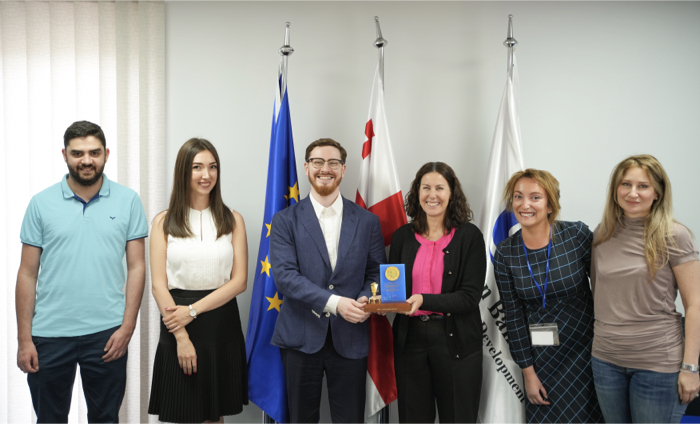
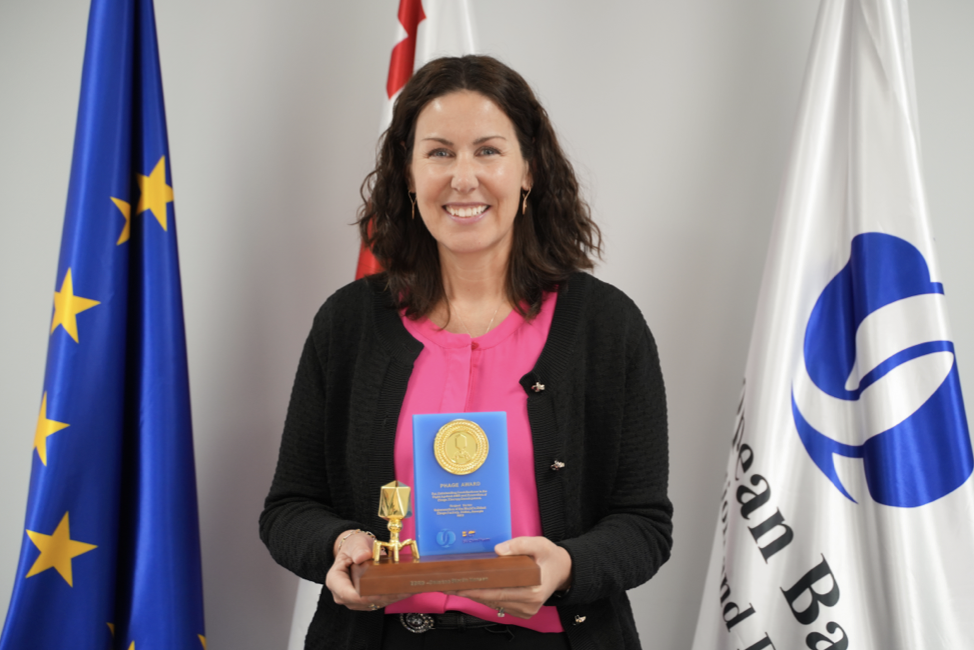
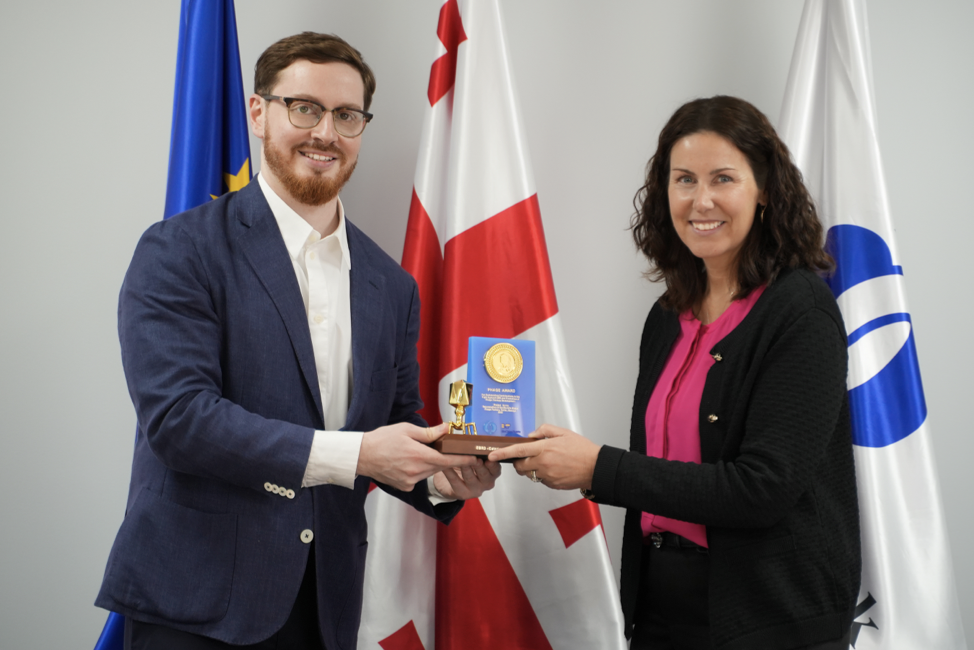
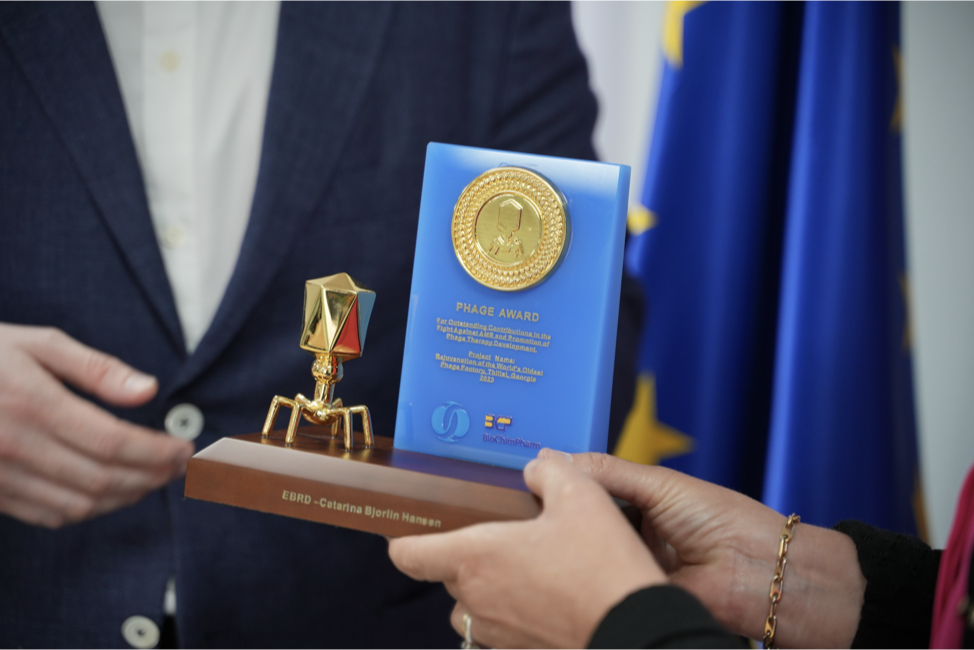
24 May, 2023
The first EU GMP standard phage factory was opened in Georgia
BioChimPharm (BCP) is a Georgian-based, biopharmaceutical Company engaged in R&D, production and marketing of sustainable alternative to antibiotics. To develop innovative products, company uses bacteriophages (phages), which are the natural enemies of bacteria.
BioChimPharm possesses unique technological knowhow and over 80 years of accumulated experience in R&D and the production of antibiotic alternatives. BCP is an ISO 9001-2015 certified, multi-award-winning Company with more than 60 people, 15 registered products and two international patents.
The Company exports its products to regional and international markets and is a regulatory authorized pharmaceutical manufacturer. The company’s production site and R&D laboratories are located in Tbilisi, Georgia in the historic bacteriophage production facility built in 1934.
In last 15 month, BioChimPharm invested over EUR 5 million in modernization and European Good Manufacturing Practice (EU GMP) compliance of its existing historical manufacturing facility of bacteriophages. The project was implemented with the support of the European Union, EBRD, World Bank, Enterprise Georgia and GITA.
” Since 2018, BioChimPharm has been actively working on the introduction of the EU GMP (European / International Pharmaceutical Production Standard) standard in the enterprise to expand its production. In particular, we want to develop new pharmaceutical forms of bacteriophage, as well as create new therapies for the treatment and prevention of various infections caused by resistant bacteria.
Up until now, the production of phage preparations and phage therapy, still is not common and widespread across the world, so we are trying to create something new, valuable on a global scale.
In general, our goal is to put the company and Georgia on the world biotechnology map and eliminate antibiotic resistance as one of the greatest threats to humanity”. – General Director Rati Golijashvili
20 February, 2023
Tbilisi, Georgia – BioChimPharm, a Georgian biopharmaceutical company, announces the completion of the modernization and renovation of its historic phage manufacturing facility, which was originally built in 1934. The facility, which is fully dedicated to R&D and the production of bacteriophage-based medications, has been updated to comply with EU GMP (Good Manufacturing Practice) guidelines, an internationally recognized standard.

The two-year investment project, worth €6,000,000, is a significant step in BioChimPharm’s mission to provide access to phage therapy on a global scale and combat the growing threat of antibiotic resistance. It also highlights Georgia’s important role in the history and development of phage technology.
The modernization of the manufacturing plant, high-tech infrastructure and production lines enables BioChimPharm to scale-up its production, making bacteriophages available for millions of patients who suffer from antibiotic resistant infections across the globe. Since phage therapy is new to many countries, this renovation will allow for increased production capacity and expanded export capabilities.
“Millions of people still do not have access to phages, leaving patients vulnerable to antibiotic-resistant infections,” said Rati Golijashvili, the general manager of BioChimPharm. “With this project, the company is increasing its production capacity and export area, thus making bacteriophages available for millions of patients across the globe. The modernization of the manufacturing plant with high-tech infrastructure and production lines will enable BioChimPharm to scale-up its production in compliance with internationally recognized manufacturing standards, to become more effective in fight against the resistant infections, and to overcome the global threat of antibiotic resistance.”

Phages are a tiny, hundred times smaller microorganisms that infect and kill bacteria and they, have been found to be highly effective against antibiotic-resistant bacterial strains.
BioChimPharm has developed a range of breakthrough products that utilizes this technology to provide an alternative to traditional antibiotics and effectively treat antibiotic-resistant infections. These products represent a significant advancement in the fight against antibiotic resistance (AMR). Georgia besides being a pioneer and the world-renowned for its 8,000-year-old tradition of winemaking, it also happens to be a cradle of Phage technology and Phage Therapy. The Country has a rich history in the development of phage technology, with early research and discoveries dating back to the early 20th century. With this newly modernized manufacturing plant, BioChimPharm continues to contribute to the advancement of phage technology and improve access to phage therapy for patients globally.
 With nearly 100 years of experience in phage R&D and production, BioChimPharm’s mission is to cut the overuse of antibiotics in the human and animal health industries and to overcome antibiotic resistant infections globally. The newly modernized manufacturing plant is located in the historic Bacteriophage Institute in the heart of Tbilisi, Georgia, and is the first enterprise producing sterile liquid dosage forms in the South Caucasus, covering the full production cycle, including the production of active pharmaceutical ingredients (APIs) and primary and secondary packaging of medicines.
With nearly 100 years of experience in phage R&D and production, BioChimPharm’s mission is to cut the overuse of antibiotics in the human and animal health industries and to overcome antibiotic resistant infections globally. The newly modernized manufacturing plant is located in the historic Bacteriophage Institute in the heart of Tbilisi, Georgia, and is the first enterprise producing sterile liquid dosage forms in the South Caucasus, covering the full production cycle, including the production of active pharmaceutical ingredients (APIs) and primary and secondary packaging of medicines.
For more information, please contact BioChimPharm at info@geophage.ge.
17 August, 2022
A sore throat is a painful, dry, or scratchy feeling in the throat.
Burning and pain are all common symptoms of a sore throat. More than 13 million people visit a doctor each year with this problem.
The main causes of sore throat are bacterial infections or environmental factors such as dry air. A sore throat usually has three forms:
8 causes of a sore throat:
1. Fever, cold and other viral infections
Phagyo is a medicine made by natural phages and is used to treat sore throats in children. It does not contain and flavoring or colouring, and the components of the drug do not come from genetically modified organisms. As a result, Phagyo has an unprecedentedly high level of safety.
Phagyo® is used for the treatment and prevention of the following upper and lower respiratory tract and ear-nose-throat infections caused by bacteria:
Phagyo® produced by the company BioChimPharm (Phage Factory). For more detailed information, please refer to this annotation.
15 August, 2022
Phages – a natural way to tackle antibiotic resistance
Antibiotic resistance is the ability of bacteria to become immune to antibiotics, rendering them powerless to treat a sick person. Antibiotic resistance causes 25,000 deaths each year in Europe, 35,000 in the United States, and up to 700,000 worldwide. According to the British government, if the problem continues to worsen, it will cause the death of 10 million people annually, with a global economic loss of over 100 trillion US dollars.
The overuse and irrational use of antibiotics are the main causes of resistance. Bacteria become resistant to antibiotics when we use them at the wrong time, or if we use them at the right time, but do not complete course.
The main way in which the human body becomes resistant to antibiotics is through the use of antibiotics in animal farms, especially in meat production. 80% of antibiotics are used in animal farms as a cheap way to maintain hygiene and increase animal weight. Antibiotics are also used to fertilize crops. As people absorb antibiotics through their food, bacteria become resistant.
Phages – the natural “enemy” of bacteria
In 1917, in India, Felix Derell, a Canadian scientist of French descent, began to observe and analyze the origin of pure white circles in the famous River Ganges. At that time, River Ganges was also known as a “magic” river. After months of investigation, he came to the conclusion that certain clean areas developed invisible germs that feed on bacteria; he named these organisms “bacteriophages” – a name derived from Ancient Greek, meaning bacterium eaters.
What are bacteriophages?
Bacteriophages, or simply phages, are the most common microorganisms on earth. They can be found on the ground, in water, on our skin, and inside our bodies. One drop of sea water contains millions of phages, while the human body contains billions of them. Phages destroy specific bacteria, but nothing else. They do not have the ability to harm human, animal or plant cells, what makes them far safer than antibiotics. To use a military analogy, antibiotics are like weapons of mass While bacteria can develop resistance to antibiotics, they cannot protect themselves against phages.
How do phages fight bacteria?
Phages eat bacteria. Phages finds bacterial cells, attaches themselves to the wall, and release their own genetic information into the bacteria. After multiplication, the phages kill the bacteria and continue to kill the other bacteria until the infection is over.
Phagyo®
Phagyo medicine is produced by BioChimPharm (Phage Factory). It is a leading phage treatment in the world of phage therapy, acknowledged in Georgia and throughout the world.
Phagyo® is used for the treatment and prevention of the following bacterial purulent-inflammatory infections:
Due to its unique and natural characteristics, Phagyo® can be used by adults and children from birth, as well as during pregnancy and lactation. The drug has no side effects, does not contain flavorings and dyes, and is not derived from genetically modified organisms. As a result, Phagyo has a very high level of safety.
One 20 ml vial of the medicine contains at least 10 million specially selected phages, ensuring its quality and effectiveness.
15 August, 2022
The history of phage therapy began about 100 years ago. In 1917, Felix Derell, a Canadian scientist of French descent, began to observe and analyze the origin of pure white cirles in the river Ganges in India. At that time, the Ganges was also known as a “magic” river. After months of investigation, he came to the conclusion that certain clean areas developed invisible germs which were destroying bacteria; he named these organisms bacteriophages (“bacteria eaters” from the ancient Greek).
After Derell returned to France, he tried to convince the sientific community in the Pasteur Institute of the existence of these invisible micro-organisms and the need to begin researching them, but the Institute was sceptical.
At the same time, Georgian scientist Giorgi Eliava was traveling in France to study vaccination technology. He was sent in France with governmental support, where he crossed paths with Derell. Eliava became a student of the French scientist, later becoming good friends.
Eliava convinced Derell to travel to Tbilisi, Georgia and establish the first bacteriophage-focused research institute with support from the Soviet government. According to urban legend, Stalin himself allocated them over 300 million rubles for this purpose, with the world’s first phage reserach institute built in 1934.
BioChimPharm (Phage Factory) began in the early 90s, when, despite the country’s difficult situation following the fall of the Soviet Union, Alexander Gholijashvili, a Georgian biotechnologist with 15 years of experience, and his colleagues founded the world’s first commercial pharmaceutical company specialised in bacteriophages.
Despite the difficult circumstances and limited resources, the company developed the phage technology even further. Currently, BioChimPharm is one of the key players in phage therapy production worldwide.
BioChimPharm’s medicines contain specially selected phages that even destroy those bacteria against which antibiotics are powerless. Phage therapy has a particular role in the fight against antibiotic resistance. The mission of BioChimPharm is to eradicate the use of antibiotics and overcome resistant infections.
BioChimPharm continues to develop the rich history of phage technology from its offices in Gotua Street, Tbilisi, Georgia.
10 August, 2022
What is stomatitis? Symptoms and Phage therapy
What is stomatitis?
Stomatitis is an inflammation of the mouth that may cause discomfort when you are eating, talking or sleeping. Stomatitis can develop anywhere in the mouth: on the cheeks, gums, tongue or lip. Stomatitis may cause single or multiple white damage and painful sores in the mouth. Mouth sores generally don’t last longer than two weeks.
What causes stomatitis?
There are two main types of stomatitis: herpes stomatitis (sores) and aphthous stomatitis. Herpetic stomatitis is caused by the simple herpes virus, while aphthous stomatitis is usually caused by poor oral hygiene or mucosal trauma.
The causes of stomatitis include:
Symptoms of stomatitis
The symptoms of stomatitis include red spots, blisters or swelling in the mouth. A burning feeling and an increase in ulcers may accompany these symptoms. The sores typically have a white or yellow coating and develop on the tongue, lips, cheeks, or gums. Other signs of stomatitis include gum swelling and excruciating pain.
Phagyo – treatment of stomatitis with phages
Since bacteria are the main cause of stomatitis, one way of treating it is with phages, which are bacteria’s natural “enemies”. Phage therapy is used to treat and prevent chronic and acute bacterial infections with bacteriophages (or simply phages).
Phagyo® is one of the most popular pharmaceutical phage products in Georgia and in the world of phage therapy. It is produced by JSC BioChimPharm (Phage Factory), a world leader in R&D and the manufacture of phage preparations with nearly 100 years of technological tradition and know-how.
Phagyo tackles stomatitis by only targeting the harmful bacteria that cause the disease, eliminating it completely.
Phagyo® is used to treat bacterial stomatitis. Brush your mouth 3 times a day.
For more detailed information, please read this annotation.
9 August, 2022
There are several types of enteroviruses and they are very common. Most of them simply result in minor illness. Infections are mostly active in the summer and fall. The viruses tend to cause illness in babies, children, and teens because most adults have already been exposed to enteroviruses, building up their immunity.
Enteroviruses may not have any obvious symptoms and can be mild. They are often found in the form of summer flu. Enteroviruses can also cause rashes on the hands, feet and face.
However, some types of enteroviruses are considerably more complex and can be more severe. Some of them have the potential to develop meningitis and inflame the tissue that surrounds the brain. The most severe enteroviruses can also cause breathing problems in children.
Enteroviruses spread through air droplets, by coughing or sneezing. A child may inhale the virus or touch an area contaminated with the virus and then touch their eyes, mouth, or nose. The risk of spreading infection is high when children do not wash their hands or wash their hands incorrectly. It can also be spread by ingesting food or water containing the virus.
Enteroviruses can manifest themselves in mild forms or without overt symptoms. The most common symptoms include the following:
TravelPhage is a preparation that protects travelers from dangerous infections. It consists of specially selected bacteriophages (phages) that effectively destroy the harmful bacteria that cause various diseases and protect the human body from food poisoning, diarrhea and infections. TravelPhage can be used from the age 3 years and above.
Travelphage is used not only for treatment, but also for preventive purposes. For detailed information, please refer to this annotation.
15 July, 2022
Cystitis
Cystitis is a bladder inflammation. The most common cause of bladder inflammations is bacterial infection, also known as UTIs (Urinary Tract Infections). Cystitis is very painful and should be treated with care to avoid it spreading to the kidneys and causing serious problems.
Cystitis is usually caused by the following:
Bacterial cystitis is caused by the E.coli bacteria, which enters the body through the urinary tract and multiplies there. Cystitis is three times more common in girls than in boys. About 20-25% of women get some form of cystitis at least once in their lifetime. 10% permanently complain of cystitis symptoms (chronic cystitis).
Phagyo® is one of the mostly widely used pharmaceutical phage products in Georgia and in the world of phage therapy. It is produced by JSC BioChimPharm (Phage Factory), a world leader in R&D and the manufacturing of phage preparations with nearly 100 years of technological tradition and know-how.
Phagyo® is used for the treatment and prevention of the following bacterial purulent-inflammatory infections:
Phagyo® has liquid form that can be taken orally and/or through local procedures, in consultation with a doctor. The dosage for adults is 20ml two-three times a day. For more detailed information, please refer to this annotation.
30 June, 2022
30 June, 2022
On June 21 the European Business Association Georgia (EBA), with the support of the European Union organized the “EU-Georgia Business Forum 2022” in Sheraton Grand Tbilisi Metechi Palace
BioChimPharm (Phage Factory) was invited and presented as a partner of the European Business Association Georgia.
Rati Golijashvili, General manager of BioChimPharm, participated in panel discussions and shared his experience on challenges of the EU pharmaceutical manufacturing standards (GMP) compliance process, EU support, export opportunities for Georgian businesses to EU 500 million market and about Georgia, destined to be the part of the European Family. Last but not least, on advantages of Bacteriophages and its significance for Georgia and the whole world in fight against antibiotic resistance.
The forum was attended by over 300 people, including the EU Ambassador to Georgia Carl Hartzell, representatives of the Georgian Parliament, Government, Business Support Organizations, European Businesses from different sectors, Diplomatic Corps, International Organizations and Financial Institutions.
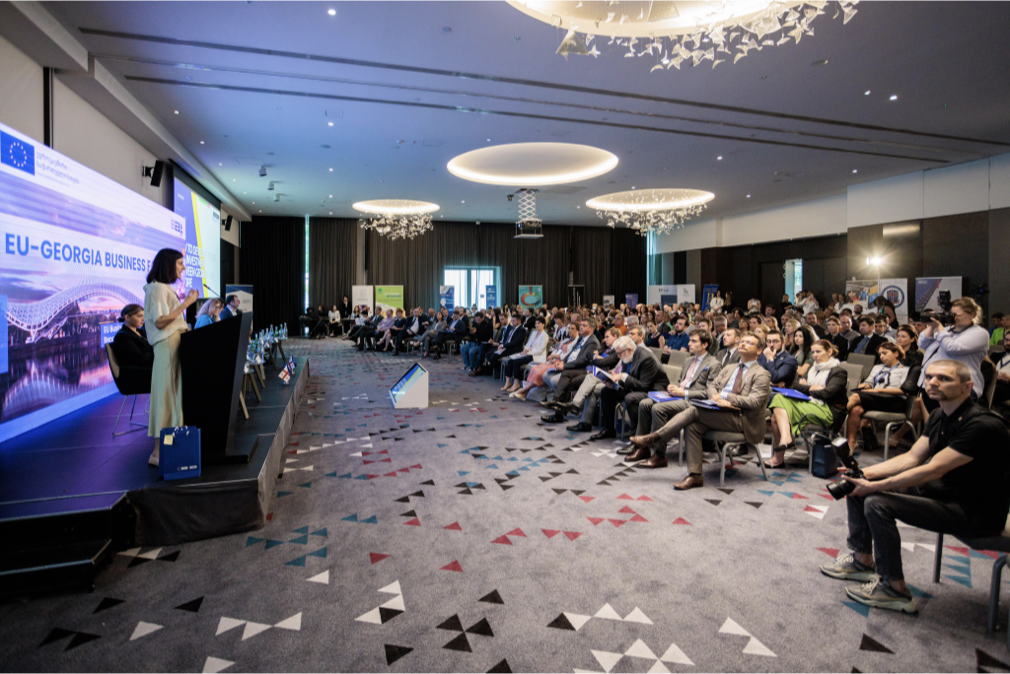

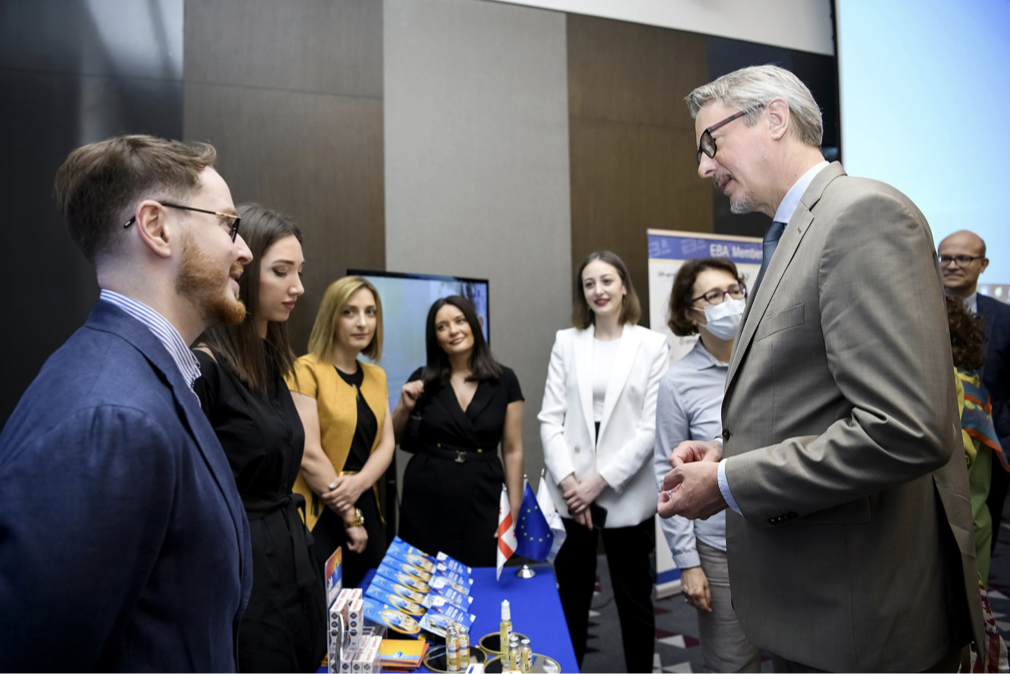

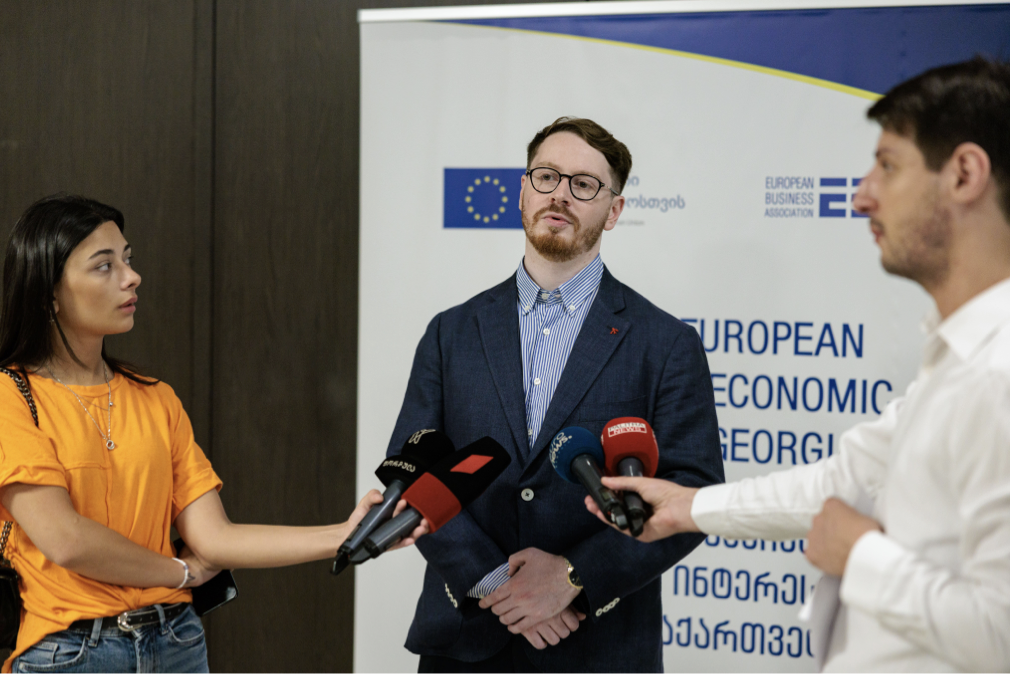


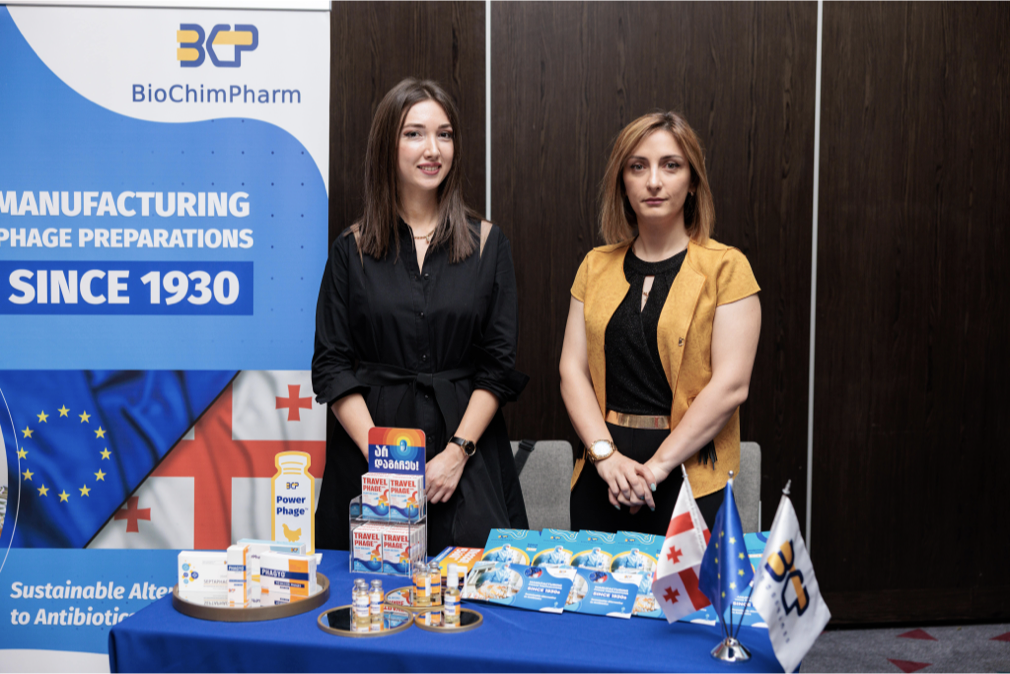

24 June, 2022
Bacteriophages (Phages) are microorganisms that target and kill specific bacteria. Phage therapy is effectively used to treat and prevent bacterial infections (including antibiotic resistant infections) by killing harmful bacteria that cause illnesses, while at the same time not affecting beneficial bacteria and microbiome of the human body.. Substitution of irrational use of antibiotics, which fuels development of the resistance (bacteria becomes resistant to certain antibiotics) is one of the greatest challenges for the society and security in terms of the emerging global threat of antibiotic resistance. Phage therapy is the only viable alternative to antibiotic therapy nowadays. Using phage biodiversity and advanced technologies it is becoming increasingly accessible to discover new phages and develop highly effective bacteriophage based medicines, year by year. Dozens of phage preparations have commercially been and are available for more than 50 years.

Phage therapy has been successfully used to treat patients with severe, incurable infections as well as those who have developed resistance to antibiotics. A growing number of successful cases give patients, suffering from resistant infections, a hope that antibiotics can be replaced by alternative treatments such as bacteriophages. For decades, Phages have been the subject of intensive scientific investigation, which has led to astonishing results:
• Phages can be used successfully in patients whose antibiotic treatment has failed;
• Scientists have a large documentary material based on multiple investigations;
• Technological improvements have increased the number of phages that can be used to develop new medicines.
Phage therapy is a medical practice of applying bacteriophages and bacteriophage preparations for treatment and prevention of different chronic, severe infections caused by harmful (pathogenic) bacteria such as Staphylococcus (MRSA), E.Coli, Pseudomonas aeruginosa, Enterrococcus, Salmonella, Streptococcus (VRE), Proteus, Shigella, C. diff, Enterobacteriaceae, Acinetobacter and their combinations.Phage preparations are effectively used in medicine as a treatment for purulent-inflammatory infections, Bacterial infections of the upper and lower respiratory tract, gastrointestinal tract infections, in urology and infections of urogenital system, purulent-inflammatory neonatal infections, prosthetic joint infections and etc. caused by the above mentioned pathogenic bacteria. . Phages are also used to treat patients suffering from incurable multi-drug resistant infections.

Advantages of Phage therapy:
• Phages selectively target and destroy only the disease-causing bacteria, including antibiotic resistant ones;
• Unlike antibiotics, phages do not affect and damage beneficial microbiome of the human body;
• Phages are used for treatment as well as for prevention of life-threatening infections;
Phagyo® is a phage preparation and over the counter medicine that is one of the mostly used pharmaceutical product in Georgia and in the world of phage therapy. The phage preparation is produced by JSC BioChimPharm, the world leader in R&D and manufacturing of phage preparations with over 100 years of technological tradition and know-how.

Phagyo® used for treatment and prevention of bacterial purulent-inflammatory infections:
• Bacterial infections of the upper and lower respiratory tract (inflammation of the sinuses, otitis media, tonsillitis, pharyngitis, laryngitis, tracheitis, bronchitis, pneumonia, pleuritis);
• gastroenterology (enterocolitis, cholecystitis, dysbiosis);
• in urology (urethritis, cystitis, pyelonephritis);
• purulent-inflammatory neonatal infections (omphalitis, pyoderma, conjunctivitis, sepsis);
Due to its unique natural characteristics, Phagyo® can be used in adults, children, newborn babies, during pregnancy and lactation, as well as in all vulnerable groups of patients. The medicine has no side effects, does not contain flavorings and colorings, the components of the medicine are not genetically modified organisms. This is what ensures Phagyo®s unprecedented level of safety for any antimicrobial. One 20 ml vial of the medicine contains over10 million specially selected phages, which determines its quality and effectiveness.
13 June, 2022
“Bacteriophage”, abbreviated as “phage”, means the absorber of bacteria. This word is made up from two Greek words: bacterium (which means “sticks”) and phagein which means (absorption).
Phages, the most common microorganisms on Earth, are invisible to the human eye. Phages can be found on the ground, in the water, on our skin, and inside our bodies. Not many people know, that humans absorb Millions of phages every day from food and water.
Bacteriophages have been given a great mission by nature: they must protect the earth from the overgrowth of bacteria and maintain the natural balance of life on the planet. In every 48 hours half of bacteria are eliminated by phages in the oceans.
The phage specifically destroys only its respective bacteria. Phages cannot harm human, animal or plant cells, which ensures unprecedented levels of safety for any antimicrobial solution.
10 June, 2022
mkurnali.ge
Antibiotic resistance has been recognized by the World Health Organization (WHO) as a global problem. Yet a medicine is being produced in Georgia that can provide serious competition to antibiotics: bacteriophages. Three years ago, Ivane Chkhaidze, the clinical director of the Iashvili Central Children’s Hospital, was contacted by colleagues from the Netherlands about bacteriophages – highlighting the growing interest in bacteriophages, which were discovered by Georgian and French scientists a century ago, as an alternative to antibiotics in modern medicine.
We talked to Ivane Chkhaidze, the clinical director of Iashvili Hospital, about the problems caused by antibiotic resistance, phage therapy and “phages”.
When did medicine start using antibiotics?
The first antibiotic used in medicine was penicillin. It was discovered by Alexander Fleming in 1928 and was first used against infections in 1942. Medical circles thought that the invention of antibiotics had practically defeated infectious diseases. In the early years this was the case, leading doctors to believe that an appropriate antibiotic could be found for any infection found in the human body. Antibiotics worked effectively, and a huge range of them became available. For example, in 1983-92, the US Food and Drug Administration (FDA) licensed 30 new antibiotics for clinical use. But they haven’t licensed any more since 2010, because of the problem of antibiotic resistance, leading to a reconsideration of antibiotics.
What caused the change in attitude towards antibiotics?
It turns out that there are some bacteria against which antibiotics are powerless – even when used in combination. That has given modern medicine a big dilemma. We know that there are bacteria in the human body, but we do not have the resources to fight it. A new generation antibiotic, the fifth-generation cephalosporin, was last delivered in clinical practice in 2010. Although dozens of new antibiotics were developed in the 1970s and 1980s, it’s been nine years since modern medicine developed a new antibiotic to fight infections.
What caused antibiotic resistance?
The reasons are many. One of the main causes of antibiotic resistance is its inappropriate use., including the failure to complete the course of antibiotics prescribed by the doctor, the selection of the wrong dose, and the use of antibiotics in agriculture. But there are a number of other reasons that have caused the development of antibiotic resistance. This is a multifactorial problem.
Another cause is the way antibiotics work. They act not only on the specific bacteria that cause the disease, but also on all the bacteria in the body. In general, there are dangerous bacteria, as well as bacteria that are necessary for the body – which we call “friendly” bacteria. When treated with antibiotics, it’s not only the dangerous bacteria that cause the disease that die, but the friendly bacteria die too.
In addition, a wide range of drugs are particularly dangerous, as they destroy much more bacteria, damaging beneficial microflora. For example, during pneumonia, we prescribe the medicine we need to fight the bacterium that causes pneumonia, but at the same time it fights dozens of others that are not to blame for pneumonia. This is a negative side of antibiotics and one of the reasons for the development of its resistance.
How long can antibiotic resistance develop?
There is no specific timeline but this process become much faster. For example, after the introduction of penicillin into clinical practice in 1942, it took 24 years to develop resistance to it, whereas resistance to daptomycin developed in one year: its use began in 2003, but resistance developed in 2004. That is, we can say that eventually all bacteria become resistant to antibiotics.
What is the solution? What does world medicine have to do to solve the problem?
Bacteriophages were discovered by a French scientist, Felix D. Erel, in 1917, who pioneered the the use of bacteriophages in clinical practice in the 1920s alongside the Georgian scientist Giorgi Eliava. Bacteriophages can be an alternative to solve the problem of resistance. There was no particular need for its use in the previous century because there was an antibiotic that “worked” very well against the bacteria. But after the emergence of antibiotic resistance, attention returned to bacteriophages. Until now, the Phage production was used mainly in Georgia and in post-Soviet countries. Because the bacteriophage was confined to Russian-language literature, there was quite low awareness of it around the world. However, as the problem of antibiotic resistance worsened, we have entered a new stage in the history of bacteriophages with participation from foreign doctors, not only Georgian ones. Over the last 10 years, up to 100 English-language papers have been published on the drug.
To be more specific, what is the principle of bacteriophages?
Bacteriophages intentionally only destroy disease-causing bacteria in the body, without any negative side effects. The main factor distinguishing it from an antibiotic is that an antibiotic has an unintended effect on all the bacteria in the body, while a bacteriophage is more specific.
If we compare the instructions on phages and antibiotics, we can easily understand the main difference between ways they act. The instructions for the phage say that it is a remedy against five types of bacteria: Streptococcus, Staphylococcus, Escherichia coli, Proteus, and Pseudomonas. While the narrowest-spectrum antibiotic annotations list these five bacteria in parallel, the broadest range of antibiotics contains dozens. As a result, the wider the range of antibiotic action, the longer the list of side effects. Physiotherapy has no side effects. We should not forget the fact that the phage does not create a resistant microflora.
Is phage therapy prescribed before the development of inflammation or directly during inflammation?
Phages can be prescribed during inflammation, but you need to know exactly what the underlying cause is. It takes courage to fight inflammation without antibiotics. However, if the doctor is convinced that it is one of the five leading bacteria, then he can use phage therapy.
How often do you use phage therapy?
“Phagyo”, the Georgian phage therapy, can be used as it has proven its effectiveness in practice many times. I have one special story about this medicine. Three years ago, I was contacted by colleagues from the Netherlands about a bacteriophage produced in Georgia. They had a patient with cystic fibrosis, a congenital disease characterized by the presence of recurrent, bacterial inflammatory processes in the respiratory system. The patient was 18 years old and already had resistance to antibiotics, which put his life in danger. Conducting a course of phage therapy with this patient gave us much better results than antibiotic therapy.
It was after this incident that I became interested in phage therapy. It turns out that there are a number of recent interesting studies in English that have led it to be considered as a valid alternative to antibiotic therapy.
6 May, 2022
Statement on the general meeting of JSC “BiochimPharm”
according to the Law of Georgia on Entrepreneurs, the Supervisory Board of JSC “BiochimPharm” convenes another general meeting of shareholders of JSC, which will be held on May 30, 2022, at 12:00 a.m. Address: st. Tbilisi, Gotua st. 8. Form of voting: Open form of voting of the attending shareholders – by raising their hands.
Meeting agenda:
The shareholder can check the right to participate in the meeting (accounting day) from 10 May to 20 May 2022 from 10 May to 20 May 2022. The shareholder must have an ID card. Address: Independent Registrar JSC “United Registrar of Securities of Georgia” (License N 70006; I. Chavchavadze Avenue N74a, 0162 Tbilisi, Georgia, telephone number: 2225351).
The shareholder who had the right of ownership for the accounting day of the general meeting has the right to participate and vote in the general meeting. Representation is allowed on the basis of a notarized power of attorney.
For detailed information regarding the meeting and recommendations on the agenda, shareholders can apply to the Supervisory Board of JSC “BiochimPharm”.
Director of JSC “BiochimPharm”
A. Gholijashvili
13 September, 2019
Georgian biotech company BioChimPharm has won a grant from the Georgian Innovation and Technology Agency for its innovative veterinary antimicrobial product – PowerPhage.
PowerPhage is the world’s first natural antimicrobial effective in fighting harmful bacteria such as Salmonella, E. coli and Shigella.
The product aims to provide alternatives to the use of antibiotics in poultry and livestock production and fight against the problem of antibiotic resistance.
PowerPhage can replace antibiotics on chicken and livestock farms, the company says.
Unlike other antimicrobials such as antibiotics, phages selectively eliminate disease-causing bacteria without harming the beneficial microflora of the organism.
”PowerPhage works against antibiotic resistant bacteria and inhibits the spread of antibiotic resistance. It is 100% natural, non-toxic and biodegradable”, the head of the innovation and business development department at BioChimPharm Rati Golijashvili says.
PowerPhage is still in the final stages of development, but will go public shortly.
The company BioChimPharm (BCP) has more than 80 years of experience in developing and manufacturing phage-based, alternative antibiotic remedies. The company is engaged in the development and production of a sustainable alternative to antibiotics.
The development and research of the phage-based therapy in Georgia is connected with the Georgian physician, bacteriologist and phage researcher George Eliava (1892-1937). Together with French-Canadian scientist Felic D’Herelle, who first discovered bacteriophages, Eliava had founded a bacteriological institute in Tbilisi in 1923. Giorgi Eliava was executed during the Stalin’s red terror in 1937.
24 May, 2017
Lorem Ipsum is simply dummy text of the printing and typesetting industry. Lorem Ipsum has been the industry’s standard dummy text ever since the 1500s, when an unknown printer took a galley of type and scrambled it to make a type specimen book. It has survived not only five centuries, but also the leap into electronic typesetting, remaining essentially unchanged. It was popularised in the 1960s with the release of Letraset sheets containing Lorem Ipsum passages, and more recently with desktop publishing software like Aldus PageMaker including versions of Lorem Ipsum.
It is a long established fact that a reader will be distracted by the readable content of a page when looking at its layout. The point of using Lorem Ipsum is that it has a more-or-less normal distribution of letters, as opposed to using ‘Content here, content here’, making it look like readable English. Many desktop publishing packages and web page editors now use Lorem Ipsum as their default model text, and a search for ‘lorem ipsum’ will uncover many web sites still in their infancy. Various versions have evolved over the years, sometimes by accident, sometimes on purpose (injected humour and the like).
Contrary to popular belief, Lorem Ipsum is not simply random text. It has roots in a piece of classical Latin literature from 45 BC, making it over 2000 years old. Richard McClintock, a Latin professor at Hampden-Sydney College in Virginia, looked up one of the more obscure Latin words, consectetur, from a Lorem Ipsum passage, and going through the cites of the word in classical literature, discovered the undoubtable source. Lorem Ipsum comes from sections 1.10.32 and 1.10.33 of “de Finibus Bonorum et Malorum” (The Extremes of Good and Evil) by Cicero, written in 45 BC. This book is a treatise on the theory of ethics, very popular during the Renaissance. The first line of Lorem Ipsum, “Lorem ipsum dolor sit amet..”, comes from a line in section 1.10.32.
The standard chunk of Lorem Ipsum used since the 1500s is reproduced below for those interested. Sections 1.10.32 and 1.10.33 from “de Finibus Bonorum et Malorum” by Cicero are also reproduced in their exact original form, accompanied by English versions from the 1914 translation by H. Rackham.